#and their reference is the part talking about more overt presentations of DID which IS less common
Text
Seeing r/systemscringe straight up misinterpreting the DSM is disappointing but not surprising
#they're trying to say only a small percentage of people with DID have alter names#and their reference is the part talking about more overt presentations of DID which IS less common#that happens to mention names#like buddy there is a reason it mentions things like different hairstyles and personalities and ACCENTS#a person with DID internally having different names does not make them fall into that small percentage by itself#because for a lot that is an internal thing that is not externally obvious in real life#most of the people with DID you see online are not going around announcing their individual names every time a different alter fronts irl#that passage is telling that it is more common for DID to be covert#syscourse
16 notes
·
View notes
Note
Hi miss Raven!! I was wondering what is Rollo's character actually like in game?? I've seen people talk about it but only about how he's obsessed with Malleus. There's gotta be more to his character right?? 😭😭


The whole “Rollo is obsessed with Malleus” thing is being circulated because it’s based on a single sinister line in the opening to Glorious Masquerade. He talks about how he wants to erase “those irritating people” (it is not specified who he is referring to), then achieving peace and freedom as a result of that. Rollo follows up by saying that he’s looking forward to seeing Malleus in particular out of all the guests for the masquerade (while making THIS suspicious expression):

If you listen to this opening, Rollo is also heard doing the classic “evil villain laugh”, and he sounds markedly self-assured and arrogant. This is many people’s first experience with the character, and perhaps the most “overt” and easily recognizable trait about him, so that’s probably why it’s the thing people most remember or immediately jump to when describing Rollo.
Fans are still theory crafting based on that line from the opening (ie they’ve come to the conclusion that Rollo is fixated on Malleus) and the fact that Rollo’s Disney counterpart was also infamously obsessive. Some people seem to think the sentiment is negative (ie Rollo has an issue with Malleus and/or with fae in particular), while others think the sentiment is positive (ie Rollo is a secret Malleus fanboy/just wants to be Malleus’s friend, but is constantly misread because of his dour face). In any case, we have not gotten confirmation of either theory, and nor is “obsessed with Malleus” Rollo’s entire personality. (I mean, even the ACTUAL confirmed “obsessed with Malleus” character, Sebek, has his own personality outside of that.)
When the NRC students actually get to meet Rollo in the event’s story, he doesn’t initially present the same character as he does in the opening. Here is what we know to be true of Rollo, as well as some broad observations I’ve made about him. (PLEASE NOTE: as of this post going live, there are only 2 out of 5 parts of the event out; the observations made below are reflective ONLY of those first 2 parts.)
Rollo is introduced as a third year and the student council president of Noble Bell College, a status which is similar to that of dorm leader at Night Raven College.
A lot of people have been assuming that it was Rollo that explicitly extended a personal invitation for Malleus to attend the symposium; however, this is not confirmed to be the case. When Crowley goes to Malleus to communicate that he’s been chosen to go along with the other 10 picked via lottery, Crowley says, the “hosts” (plural; ie Noble Bell College students organizing the event) wanted Malleus to attend. It can be inferred that Rollo may have played a role in this or used his influence as student council president to pull the strings. However, it is just as likely that everyone else at NBC wanted Malleus to come because of Malleus’s notoriety (crown prince AND one of the top 5 strongest mages in the world) and Rollo just agreed with it because it aligned with his personal motives.
He is shown to be very polite, but also aloof (note that he is not speaking with the same fervor as he did in the opening). Deuce thinks that Rollo is expressionless, and Epel thinks Rollo looks angry. This seems to make Rollo akin to the “kuudere” archetype (at least on a superficial level), which is defined by being stoic, cold, and emotionless but having a secret side to them (usually far sweeter than their initial personality would have you believe).
Rollo prefers to remain formal; he’s confused by Rook gracing him with a nickname (then again, who wouldn’t be?) and generally speaks politely.
Continuing from the previous point, Rollo seems to take offense to Sebek referring to him as “human”. Remarkably, Rollo is the first character to correct Sebek by reminding him what his actual name is.
It seems like Rollo is disguising his true thoughts and intentions; when Sebek overhears him saying something negative (”it’s deplorable”), Rollo calmly denies having ever said anything at all.
Rollo is implied to be dutiful and diligent, not only in his work as student council president but also as one of the hosts for the symposium; he read up on each attendee before they arrived on his campus (thanks to the documents Crowley provided for him), and is aware of their full names, titles, races, and various family connections. Something that Azul mentions (after being handed his masquerade outfit) is that it’s unnerving that NBC (and thus, potentially Rollo) is aware of the prescription of his lenses (as they provided him with new glasses with his new look).
Rollo prioritizes his responsibilities; he stays behind at NBC to process other guests before going out to the City of Flowers for the festivities.
Despite his cold exterior, Rollo can be affable too. He invites the NRC students to approach him and have a conversation with him if they spot him in town.
Silver remarks that Rollo must have a good memory to remember so many new names. Again, this plays into his diligence.
Some people have noticed that Rollo is strangely friendly to Yuu (he says to them that it must be troublesome being a magicless human surrounded by magic users all the time, then invites them to relax and enjoy the event). At this point, it’s unclear whether this is fanservice for the player or if there is more meaning behind his words, but this may indicate sympathy for Yuu or those similar to Yuu.
Rollo tells us that students of Noble Bell like to keep things clean and, above all else, have faith in purity and integrity. Presumably, this is also true of himself (example: he catches Ruggie about to steal the coins in a hat and, while glaring at Ruggie, says something to the effect of, “I hope you weren’t intending to take the contents of that”).
Continuing from the last point, Rollo seems to hold a disdain for those that violate the peace and disregard laws, such as petty thieves.
It’s implied that Rollo approves of using any means necessary to stop evil deeds; he remarks that doing such a thing is “wonderful”.
He has a habit of holding a handkerchief over his nose and mouth. This seems to mostly be done in instances when Rollo is annoyed about something, such as talking about how noisy others are or when he’s trying to stay polite about something he disagrees with (such as his vice president and aide insisting that everyone wear festival clothes for the symposium).
There’s a lot of fan theories flying around about how Rollo may dislike the fae, but there are also implications that he dislikes the poor or those of “lower class”, as he grimaces and does the handkerchief thing when Ruggie comments about people of all classes and backgrounds dressing up for the festivities.
The vice president tells Idia that Rollo is strict about keeping schedules.
He is very knowledgeable and serves as a good tour guide for the NRC boys. Rollo shares many of his favorite spots and local treats and goods with them
He explains the history of important businesses and icons in the city and is genuinely proud of where he comes from. Rollo also seems to take offense when others question the traditions of the City of Flowers or seek to only gain from them or take advantage of them (ie like when Idia comments on the security is “too loose” if you toss your coins into a hat for street vendors, when Ruggie tries to steal the coins in the hat, etc.)
Basically, what we know of Rollo in the event opening vs in the actual event story is like knowing two different people that share the same face (although the story has certainly alluded that Rollo is hiding something). He is level-headed and intelligent; he is someone that values tradition and formalities, and displays disdain for those that rebel against certain conventions.
I’m personally really looking forward to the big reveal to see the full scope of Rollo’s character! Fingers crossed for more Rollo content in part 3! 🤞
#Rollo Flamme#Malleus Draconia#twst#twisted wonderland#disney twisted wonderland#spoilers#notes from the writing raven#Yuu#Idia Shroud#Silver#Dire Crowley#Azul Ashengrotto#Sebek Zigvolt#Rook Hunt#Rollo Flamm
396 notes
·
View notes
Text
I know I'm the only person who still cares about this but I'm gonna say my "I think I turned my childhood friend into a girl" opinions cuz I've seen enough bad takes.
To preface this: I've read a lot of otokonoko Mangas and queer Mangas are beloved to me. I had been reading this manga since way before it was picked up by sevenseas and I really disappointed when the translation came out.
In case ur seeing this and have no idea what I'm talking about "I think I turned my childhood friend into a girl" is about mido who is a guy who likes cosmetics who one day tries them on his gloomy friend hiura and it makes hiura insanely cute, hiura who has a crush on mido starts wearing makeup and dressing femininely to impress mido finds out he's more comfortable in feminine clothing and gains confidence"
Said controversy was when sevenseas printed the manga with overt trans language that was no present in the original and were pressured into eventually retranslating the first volume to be closer to the original
Now that everything is laid out let's go over 2 facts.
number 1: the author (azusa banjo) during the controversy explicitly stated that was not their intention. This is self explanatory if the author said u did something wrong then u did something wrong, it's their authority those are THEIR characters and THEIR story.
Number 2: the trans edits made make no sense on context of the story. Only volume one was printed and the edits made were pretty minor stuff like using she/her pronouns, and referring to hiura as a girl. Remember, this is volume ONE. I own the original print and there's multiple pages where hiura says "I'm a boy" and then cuts to mido using she/her pronouns for him. Hiura hasn't even had time to have his trans revelation (which would be during the beach arc if u want to claim he has one). It literally makes no sense in story context.
Some crazy shit I've seen people say
"it's transphobic to say that hiura isn't trans" I'll admit I am not transgender. I consider myself not cis but not trans so my word isn't like law but We're talking about character interpretation. The dialog is ambiguous you can't say "it's transphobic to not interpret this character the same way I do"
"Sevenseas localized it" do you think that Japanese people just don't know what transgender people are????? There's a ton of good transgender studies if you look. I could make an argument that hiura was made less complex by erasing the otokonoko aspect of his character. A big part of otokonoko media is expression you don't want to perform masculinity but you aren't a girl, you're in the middle (go read senpai wa otokonoko it does this gender expression so beautifully but even the silly ones have hints of this). Things aren't black and white it's not cis or trans.
"It would have been this way if Japan hadn't censored it" adding on to my earlier statement like I said there's tons of transgender Mangas but also.... censorship from who? It's own author?? We see more infantilization of Japan that the west loves to do where they don't know about LGBT issues. It's own author said that it was not their intention for hiura you have to listen to the author
If u want hiura to be trans? Fine thats your interpretation. I had thoughts of that too when I originally read the manga. But you have to understand the difference between interpretation and the actual text.
#Anywayyy that was a really long rant#I've had this in me since the original sevenseas print dropped#I went to the tumblr tag to see if ppl were talking about the most recent chapter and nope the top post is still about this shit#Hiura is so beautiful#I actually still own the original print and the revised edition they're both on my shelf together#With the rest of my otokonoko manga lmao#I feel like I'm not gonna get hate for this cuz no one even remembers this controversy but if I do I don't really care#I have to defend this manga I hold dear and it's otokonoko themes#Even if hiura comes out next chapter and says he's a girl the original print would still be wrong because it was the first fucking volume#I had more insane shit to complain about but I got tired#I think I turned my childhood friend into a girl#I turned my childhood friend into a girl
1 note
·
View note
Text
Brickclub 4.10.4 ‘Outbursts of former times’
The “Jeanne” namedrop in this chapter singlehandedly clotheslines 3 out of the 4 translators in front of me; Wilbour and Hapgood both say “Jeanne and her* [number] companions” (Wilbour thinks it’s a hundred and six, Hapgood thinks it’s six hundred.) (Wilbour is correct).
*for non-French speakers: the problem here is that possessive pronouns in French take the gender of the thing possessed rather than the gender of the possessor like in English, and Jeanne is a common feminine name, so you do actually have to just know Jeanne is a man to translate the sentence correctly. HOWEVER, Charles Jeanne the most famous insurgent in this rebellion, so that’s not that much of an excuse.
Rose manages to realize Jeanne is a man, but for some reason talks as if Hugo is referring to a long ago event rather than the one currently happening:
In under an hour, twenty-seven barricades had sprung up out of the ground in the Les Halles quartier alone. At the centre was the famous house at no. 50, once the fortress where the worker Jeanne and his one hundred and six companions holed up,
And her footnote says, bafflingly:
At 50, rue Saint-Merry (or Saint-Merri), at the intersection of the rue Saint-Martin, a worker whose name is recorded only as Jeanne led one of the strongest points of resistance to the National Guard. Jeanne and twenty other survivors were later deported.
1) His name is Charles Jeanne, we have his letters, he has a wikipedia page here, and a French wikipedia page here, which has more detail including his eye color, hair color, height and home address
2) He was not deported, he led the charge that got him and several of his companions out alive, though he was later arrested and imprisoned in Mont Saint-Michel, which is an island off the coast of Normandy and considered part of France, unless that counts as deportation somehow because it’s an island
3) HOW did you do any research about the June Rebellion at all without learning Charles Jeanne’s name????
Only FMA manages to get through the sentence unscathed with:
In less than an hour twenty-seven barricades rose from the ground in the market quarter. At the center was that famous house, No. 50, which was the fortress of Jeanne and his hundred and six companions,
I’m picturing all the translators in a race stumbling into in a slapstick cartoon heap at this point, with only the (sometimes overly!) cautious and sensible FMA managing to skirt around the pileup and stay on their feet.
But the thing that Rose ungracefully slammed into is an interesting thing about this chapter, actually? It’s all carefully couched as something that happened a long time ago, in a way that belies the immediacy and urgency of the action. Hugo’s mention that the house where Jeanne defended his barricade is famous now, the fact that Hugo himself wandered into the action all those years ago, and the chapter title which feels Very overt about saying this all happened "in former times” all point towards an effort to distance the present from all this. The chapter title may even go so far as to imply “this sort of thing doesn’t happen anymore (so it’s safe for me to talk about).”
And yet, as @fremedon points out, we’re at the part where Hugo is also most committed to laying on the suspense and letting us feel like this could still go either way.
It feels like he’s using this doublespeak to reassure the censors while at the same time whispering to the prospective future insurgent, “riots like this are balanced on a knife’s edge, and next time---”
43 notes
·
View notes
Text
Taking some time to talk about S'ria and Aymeric
warnings: references to past drugging (canon), manipulative behavior (not by Aymeric)
Ao3
S'ria was mostly trying to ignore it, on the hopeful doubt that he was wrong. It was – well, he was unavoidably paranoid around nearly everyone, but he was rarely wrong about when someone truly held feelings towards him. (Whether they be romantic or something far more immediate and unwanted.)
S'ria had known about Haurchefant for a while, at least. Perhaps his warm nature was what softened the worst of the discomfort, or perhaps it was how he'd not pushed the matter or tried anything in the length of time they'd known each other.
(Well, some things were perhaps meant to be innuendos, but he never had to acknowledge them – and Haurchefant's choice of phrasing eventually began to be worded as platonically as possible, clearly sensing his discomfort.)
There really was no one particular reason S'ria didn't feel nearly as on edge around Haurchefant as he should've. That didn't change the fact that, by the time he showed up in Dragonhead traumatized and half frozen with Alphinaud in tow, he fully trusted Haurchefant to not pressure him or even confess formally at all. Being alone in a room with him wasn't something that would scare him, at least.
These were not necessarily honors that Aymeric had earned, though. (They may both have been soldiers, but only one was a politician as well.)
And, to be frank, S'ria felt extremely ill-inclined to make that concession for another so soon after Haurchefant's death.
S'ria had not started to notice anything for a while, the mannerisms of one asking favors from the Warrior of Light now long familiar. It was not until shortly after Haurchefant's death – and especially after the Archbishop’s – that S'ria truly began to wonder if… Aymeric was possibly looking to court him. Was that there the whole time, or was it something new now that S'ria had actually been successful in these last few battles?
It was not extremely overt, but just the little things – the way he looked whenever S'ria entered the office, the somewhat embarrassed way in which he brought up having a drink together, there was something.
Something he was content to never have confirmed and to have tentative faith that Aymeric wouldn't be fool enough to actually try. He would be quite content to be wrong entirely as well.
“Gods help me, I think it might be love.”
The first reaction S'ria gave to Thancred, missed by the man looking away, was to glare at him. The last thing he wanted was an assessment from someone who was very likely correct, and for it to be treated like a casual topic of light joking and intrigue was not much better. It was a small blessing that Thancred's very next sentence was a pivot in topic, such that S'ria need not figure out a response to that unnecessary little statement.
And it remained… more or less unchanged of a situation, as S'ria did his best to walk a line between still friendly and absolutely not interested.
Things came to a head when S'ria found himself rather abruptly presented with a dinner invitation to the Borel manor – specifically a private dinner, just himself and his host.
Aymeric was … it was complicated. S'ria thought he was a good leader, a compassionate person, and someone with a strong moral compass. He was pleased to both call the man a friend and for him to be in a position of power. But, despite all that, S'ria had no wish to be truly alone with him somewhere isolated – in a situation that could be very easily misconstrued as accepting courtship by attending at all.
The dinner part too – would it not be terribly rude to join a person for dinner and barely pick at your food, ignoring any beverages? The incident at Falcon's Nest was so very fresh, and S'ria was honestly infuriated with himself that he hadn't read the clear signals of danger that had surely been present. No matter how much he believed in Aymeric's moral compass, he simply could not bear the thought of even risking poisoning or worse.
For both your safety and peace of mind, as well as the desire to not lead Aymeric on, S'ria was inclined to refuse. He'd meant for it to come out more polite, but… well, clear and honest is hardly a mortal sin, for him to plainly say that he'd rather not accept the invitation.
The knight looked completely thrown off by the answer and S'ria spared him some sympathy. Surely this would be awkward news to return with, and likely did not expect S'ria to turn down a summon from such an important man.
“You – You would rather not?”
The knight began stuttering and S'ria begrudgingly prepared to counter the likely argument that he ‘could not just say no to one such as Lord Aymeric’. What S'ria was given as a response instead had him so taken aback that he had to simply pray that Aymeric himself was wholly uninvolved in preparing such an indelicate jab.
“Well… that is a great shame. The messenger went out of his way to express how very much his lord was looking forward to the occasion…”
This. This was the exact sort of situation S'ria desperately wanted to avoid, why he wanted a clear mutual understanding that he was unavailable. This surely was not Aymeric's fault, but S'ria hated that whatever pining was clearly so obvious that his manservant felt the need to pass along suggestions for underhanded manipulation along with the invitation.
“Forgive me, but might I trouble you to reconsider, if only as a courtesy to your friend, Ser Aymeric?”
A growl nearly clawed its way out of S'ria's throat, (where he promptly killed it, with such a thing being best avoided for the sake of his civil reputation...and the ever lingering threat of having his actions be interpreted as animalistic to such an undiverse people) but he already knew he was going to say yes. Likely, he was already going to before that last bit was added, but it definitely set his answer as being unable to refuse. Not without resentment – and truly, if he had any sense that Aymeric had encouraged this behavior he may never speak to him again – but he knew he'd end up going anyway.
Hours later, a relaxed and visibly wine-flushed Aymeric would lower his voice and ask S'ria what was next for him, and what he maybe wanted for himself? S'ria could not decide if the sudden interruption of a new Alisaie-shaped crisis being dropped in his lap was a helpful or unfortunate thing.
(Yes, the knight's dialogue is 100% canon. Startled us quite a bit while playing, oh jeez.)
(Whatever this was on Aymeric's part, it's dropped by some point during Stormblood. Even if S'ria had seemed interested (and he had NOT), Aymeric wasn't so sure he'd the time to court someone anyway.)
#ffxiv-oc#snow-system#S'ria 🌸❄️#writings#ffxiv-reactions#continuing to hop around the timeline a bit even as we already did two round-ups#have some more post HW
1 note
·
View note
Text
recently resumed watching The Fall after about a year or two after I finished s1 & then stopped. on s2 atm
I think I found it recc’d somewhere on reddit after I got into Hannibal & Killing Eve bc Gillian Anderson, or bc similar themes (serial killer & detective being mutually obsessed or smth)
mostly white and allocishet, a bit annoying but forgivable
some interesting critique: https://www.heraldscotland.com/news/14763203.drama-dock-fall-glamorise-rape-violence-women/ (and yeah, when you’re marginalized you do tend to notice when the victims are only ever white cishet conventionally attractive women. but not unforgivable ig, more just something to note). I would put it mostly in the box of “story which tries to and does treat rape/misogyny/torture/murder in a serious/non-glamorizing light,” maybe 5% of it could be argued to be just the usual misogyny-as-spectacle/entertainment but it’s defs a lot less than usual
two or three sentences of radfem-ish & bioessentialist rhetoric, but forgivable
cops are way too competent and nice, but forgivable\
some implied paramisia, some overt paramisia (i.e. the cop referring to a CSAbuser as a [censored]), some uncomfortably relatable portrayals of paraphilias and kinks and sadism and hypoempathy on the part of the serial killer, some unfortunate implication that those are present in the majority of violent abusers. Might’ve used stigmatizing anti-cluster-B language in S1 too but I can’t remember if it did or didn’t (the news articles talking about the show definitely are).
One of the most striking parts was the continuum of misogyny and (white) (cis) male misogynistic violence they showed, from the husband with violent friends who’s openly violent and adopts obvious macho violent-cis-male aesthetics and openly expresses violently misogynistic beliefs even in front of a female cop down to Paul, a respectable licensed therapist who can talk the talk about how abuse culture is bad and abuse is never the victim’s fault and consensual kink is bad and rape is very different from that and understand exactly why feminists believe it and genuinely help victims and be decent to his family and still have feelings of entitlement to women’s bodies and still enact horrific violence on the side (my abuser who knew why csa is bad and was anti-csa even in the more controversial/complicated cases that more normies are ok with and yet still did it to ppl)
And I found it especially important how Paul’s treatment of Katie was misogynistic ageism in particular: how most cis male adult CSA perpetrators aren’t youthlibs or using youthlib-resembling rhetoric, they don’t care about/want what’s best for children or teens, they genuinely hate youth and view youth as lesser, almost identical to how they hate women and view women as lesser and thus deserving of violent treatment because they’re entitled to them. How he infantilized her and persistently called her a “child” when every time she said she was not ok with that and it made her upset and spouted the usual adultist rhetoric (you don’t know what you’re talking about/thinking about/choosing/doing, you’re too young to understand the real adult world, you’re just a stupid little teenage schoolgirl). She wouldn’t strictly fall into either category of “naive child who knows absolutely nothing and cannot make her own choices at all” or “mature adultlike teenage temptress who is identical to an adult apart from chronological age,” but a large part of her differences from the latter was obviously societally imposed--she’d likely never had those talks about consent and abuse and how to set boundaries and the dangers of violent cis men, and she’d never been through the types of trauma which force you to learn that yourself, because before she’d met Paul she’d mostly coasted through life on her white allocishet privilege. She can do the whole self-sufficient thing, but doesn’t do it with caution or awareness of the dangerous side of the adult world. I’m not strictly anti aoc 16 per se, but Katie does show that 16 isn’t a magic number and she does carry over a lot of her naivety from when she was 15 after her birthday, but it’s not for bioessential reasons, it’s because she hasn’t been through certain events/life experiences that are generally withheld from people of her demographic.
Sally Ann’s reaction to being told Paul “was having an affair w/Katie” is classic victim-blaming & CSA culture: instead of attacking and solely blaming her husband for supposedly having sex w/a 15-year-old, she gets mad at Katie and later on is repeatedly hostile toward Katie “for having a three(?)-month underage affair with her husband” as if abuse is the victims’ fault and the power relationship between the two was equal. Many of the news articles discussing her character follow that pattern too, downplaying the abuse she’s going through (i.e. “teenage lover,” “over the course of the series she develops a natural liking and understanding towards him”).
So she genuinely believes he doesn’t hate her, doesn’t feel entitled in a violent manner toward her, doesn’t want to hurt her, isn’t “that type of guy” and their relationship is “not like that” and her friend mentioning possible concerns is brushed off as “you don’t get it we’re unique.” Even though he repeatedly ignores or violates her consent in very obvious ways (i.e. assaulting her, tying her up), Katie still maintains a romantic fantasy idealized version of Paul in her head, does risky things regarding him which also harm his other victims and protects him for the thrill/power rush of it believing she is immune to the possibility of being hurt either by him or by other external factors/third parties in return. Her friend doesn’t give a damn either, when Katie gushes about them having had sex she cheers them on instead of being concerned.
Many viewers will conclude that abolition of patriarchy is necessary to prevent violence like the depicted from occurring/occurring again, but fewer will grasp how adultism contributes major portions as well.
I don’t rate media anymore, and I don’t rec/non-rec things (stressful), and I don’t think it fills my particular niche anymore, but it’s overall ok & mostly fun to watch ig.
0 notes
Text
Annette: The AD Devotee Review
So I saw Annette on its premiere night in Cannes and I’m still trying to process and make sense of those 2.5 hours of utter insanity. I have no idea where to begin and this is likely going to become an unholy length by the time I’m finished, so I apologize in advance. But BOY I’ve got a lot to parse through!!
Let’s start here: Adam’s made plenty of weird movies. The Dead Don’t Die? The Man Who Killed Don Quixote? There are definitely Terry Gilliam-esque elements of the unapologetically absurd and fantastical in Annette, but NOTHING comes close to this film. To put it bluntly, nothing I write in this post can prepare you for the eccentric phantasmagoria you’re about to sit through.
While the melodies conveying the story – at times lovely and haunting, at times whimsical, occasionally blunt and simple – add a unique sense of the surreal, the fact that it’s all presented in song somehow supplies the medium for this bizarre concoction of disparate elements and outlandish storytelling to all coalesce into a single genre-defying, disbelief-suspending whole. That’s certainly not to say there weren’t a few times when I quietly chortled to myself and mouthed “what the fuck” from behind my mask when things took an exceeding turn to the outrageous. This movie needs to be permitted a bit of leeway in terms of quality judgments, and traditional indicators certainly won’t apply. I would say part of its appeal (and ultimately its success) stems from its lack of interest in appealing to traditional arbiters of film structure and viewing experience. The movie lingers in studies of discomfiture (I’ll return to this theme); it presents all its absurdities with brazen pride rather than temperance; and its end is abrupt and utterly jarring. Yet somehow, at the end of it, I realized I’d been white-knuckling that rollercoaster ride the whole way through and loved every last twist and turn.
A note on the structure of this post before I dive in: I’ve written out a synopsis of the whole film (for those spoiler-hungry people) and stashed it down at the bottom of this post, so no one trying to avoid spoilers has to scroll through. If you want to read, go ahead and skip down to that before reading the discussion/analysis. If I have to reference a specific plot point, I’ll label it “Spoiler #___” and those who don’t mind being spoiled can check the correlating numbers in my synopsis to see which part I’m referencing. Otherwise, my discussion will be spoiler-free! I do detail certain individual scenes, but hid anything that would give away key developments and/or the ending.
To start, I’ll cut to what I’m sure many of you are here for: THE MUSICAL SEX SCENES. You want detailed descriptions? Well let’s fucking go because these scenes have been living in my head rent-free!!
The first (yes, there are two. Idk whether to thank Mr. Carax or suggest he get his sanity checked??) happens towards the end of “We Love Each Other So Much.” Henry carries Ann to the bed with her feet dangling several inches off the floor while she has her arms wrapped around his shoulders. (I maybe whimpered a tiny bit.) As they continue to sing, you first see Ann spread on her back on the bed, panting a little BUT STILL SINGING while Henry’s head is down between her thighs. The camera angle is from above Ann’s head, so you can clearly see down her body and exactly what’s going on. He lifts his head to croon a line, then puts his mouth right back to work.
And THEN they fuck – still fucking singing! They’re on their sides with Henry behind her, and yes there is visible thrusting. Yes, the thrusting definitely picks up speed and force as the song reaches its crescendo. Yes, it was indeed EXTREMELY sensual once you got over the initial shock of what you’re watching. Ann kept her breasts covered with her own hands while Henry went down on her, but now his hands are covering them and kneading while they’re fucking and just….. It’s a hard, blazing hot R rating. I also remember his giant hand coming up to turn her head so he can kiss her and ladkjfaskfjlskfj. Bring your smelling salts. I don’t recommend sitting between two older ladies while you’re watching – KINDA RUINED THE BLATANT, SMOKING HOT ADAM PORN FOR ME. Good god, choose your viewing buddy wisely!
The second scene comes sort of out of nowhere – I can’t actually recall which song it was during, but it pops up while Ann is pregnant. Henry is again eating her out and there’s not as much overt singing this time, but he has his giant hands splayed over her pregnant belly while he’s going to town and whew, WHEW TURN ON THE AIR CONDITIONING PLEASE. DID THE THEATER INCREASE IN TEMPERATURE BY 10 DEGREES, YOU’RE DAMN RIGHT IT DID.
Whew. I think you’ll be better primed to ~enjoy~ those scenes when you know they’re coming, otherwise it’s just so shocking that by the time you’ve processed “Look at Adam eating pussy with reckless abandon” it’s halfway over already. God speed, my fellow rats, it’s truly something to witness!!
Okay. Right. Ahem. Moving right on along….
I’ll kick off this discussion with the formal structure of the film. It’s honestly impossible to classify. I have the questionable fortune of having been taken to many a strange avant-garde operas and art exhibitions by my parents when I was younger, and the strongest parallel I found to this movie was melodramatic opera stagings full of flamboyant flourishes, austere set pieces, and prolonged numbers where the characters wallow at length in their respective miseries. This movie has all the elevated drama, spectacle, and self-aggrandizement belonging to any self-professed rock opera. Think psychedelic rock opera films a la The Who’s Tommy, Hair, Phantom of the Paradise, and hell, even Rocky Horror. Yes, this film really is THAT weird.
But Annette is also in large part a vibrant, absurdist performance piece. The film is intriguingly book-ended by two scenes where the lines blur between actor and character; and your own role blurs between passive viewer and interactive audience. The first scene has the cast walking through the streets of LA (I think?), singing “So May We Start?” directly to the camera in a self-aware prologue, smashing the fourth wall from the beginning and setting up the audience to play a direct role in the viewing experience. Though the cast then disburse and take up their respective roles, the sense of being directly performed to is reinforced throughout the film. This continues most concretely through Henry’s multiple stand-up comedy performances.
Though he performs to an audience in the film rather than directly to live viewers, these scenes are so lengthy, vulgar, and excessive that his solo performance act becomes an integral part of defining his character and conveying his arc as the film progresses. These scenes start to make the film itself feel like a one-man show. The whole shtick of Henry McHenry’s “Ape of God” show is its perverse irreverence and swaggering machismo. Over the span of what must be a five minute plus scene, Henry hacks up phlegm, pretends to choke himself with his microphone cord, prances across the stage with his bathrobe flapping about, simulates being shot, sprinkles many a misanthropic, charmless monologues in between, and ends by throwing off his robe and mooning the audience before he leaves the stage. (Yes, you see Adam’s ass within the film’s first twenty minutes, and we’re just warming up from there.) His one-man performances demonstrate his egocentrism, penchant for lowbrow and often offensive humor, and the fact that this character has thus far profited from indulging in and acting out his base vulgarities.
While never demonstrating any abundance of good taste, his shows teeter firmly towards the grotesque and unsanctionable as his marriage and mental health deteriorate. This is what I’m referring to when I described the film as a study in discomfiture. As he deteriorates, the later iterations of his stand-up show become utterly unsettling and at times revolting. The film could show mercy and stop at one to two minutes of his more deranged antics, but instead subjects you to a protracted display of just how insane this man might possibly be. In Adam’s hands, these excessive, indulgent performance scenes take on disturbing but intriguing ambiguity, as you again wonder where the performance ends and the real man begins. When Henry confesses to a crime during his show and launces into an elaborate, passionate reenactment on stage, you shift uncomfortably in your seat wondering how much of it might just be true. Wondering just how much of an animal this man truly is.
Watching this film as an Adam fan, these scenes are unparalleled displays of his range and prowess. He’s in turns amusing and revolting; intolerable and pathetic; but always, always riveting. I couldn’t help thinking to myself that for the casual, non Adam-obsessed viewer, the effect of these scenes might stop at crass and unappealing. But in terms of the sheer range and power of acting on display? These scenes are a damn marvel. Through these scenes alone, his performance largely imbues the film with its wild, primal, and vaguely menacing atmosphere.
His stand-up scenes were, to me, some of the most intense of the film – sometimes downright difficult to endure. But they’re only a microcosm of the R A N G E he exhibits throughout the film’s entirety. Let’s talk about how he’s animalistic, menacing, and genuinely unsettling to watch (Leos Carax described him as “feline” at some point, and I 100% see it); and then with a mere subtle twitch of his expression, sheen of his eyes, or slump of his shoulders, he’s suddenly a lost, broken thing.
Henry McHenry is truly to be reviled. Twitter might as well spare their breath and announce he’s already cancelled. He towers above the rest of the cast with intimidating, predatory physicality; he is prone to indulgence in his vices; and he constantly seems at risk of releasing some wild, uncontrollable madness lingering just beneath his surface. But as we all well know, Adam has an unerring talent for lending pathos to even the most objectively condemnable characters.
In a repeated refrain during his first comedy show, the audience keeps asking him, “Why did you become a comedian?” He dodges the question or gives sarcastic answers, until finally circling back to the true answer later in the film. It was something to the effect of: “To disarm people. It’s the only way I can tell the truth without it killing me.” Even for all their sick spectacle, there are also moments in his stand-up shows of disarming vulnerability and (seeming) honesty. In a similar moment of personal exposition, he confesses his temptation and “sympathy for the abyss.” (This phrase is hands down my favorite of the film.) He repeatedly refers to his struggle against “the abyss” and, at the same time, his perceived helplessness against it. “There’s so little I can do, there’s so little I can do,” he sings repeatedly throughout the film - usually just after doing something horrific.
Had he been played by anyone else, the first full look of him warming up before his show - hopping in place and punching the air like some wannabe boxer, interspersing puffs of his cigarette with chowing down on a banana – would have been enough for me to swear him off. His archetype is something of a cliché at this point – a brusque, boorish man who can’t stomach or preserve the love of others due to his own self-loathing. There were multiple points when it was only Adam’s face beneath the character that kept my heart cracked open to him. But sure enough, he wedged his fingers into that tiny crack and pried it wide open. The film’s final few scenes show him at his chin-wobbling best as he crumbles apart in small, mournful subtleties.
(General, semi-spoiler ahead as to the tone of the film’s ending – skip this paragraph if you’d rather avoid.) For a film that professes not to take itself very seriously (how else am I supposed to interpret the freaky puppet baby?), it delivers a harsh, unforgiving ending to its main character. And sure enough, despite how much I might have wanted to distance myself and believe it was only what he deserved, I found myself right there with him, sharing his pain. It is solely testament to Adam’s tireless dedication to breathing both gritty realism and stubborn beauty into his characters that Henry sank a hook into some piece of my sympathy.
Not only does Adam have to be the only actor capable of imbuing Henry with humanity despite his manifold wrongs, he also has to be the only actor capable of the wide-ranging transformations demanded of the role. He starts the movie with long hair and his full refrigerator brick house physique. His physicality and size are actively leveraged to engender a sense of disquiet and unpredictability through his presence. He appears in turns tormented and tormentor. There were moments when I found myself thinking of Conan the Barbarian, simply because his physical presence radiates such wild, primal energy (especially next to tiny, dainty Marion and especially with that long hair). Cannot emphasize enough: The raw sex appeal is off the goddamn charts and had me – a veteran fangirl of 3+ years - shook to my damn core.
The film’s progression then ages him – his hair cut shorter and his face and physique gradually becoming more gaunt. By the film’s end, he has facial prosthetics to make him seem even more stark and borderline sickly – a mirror of his growing internal torment. From a muscular, swaggering powerhouse, he pales and shrinks to a shell of a man, unraveling as his face becomes nearly deformed by time and guilt. He is in turns beautiful and grotesque; sensual and repulsive. I know of no other actor whose face (and its accompanying capacity for expressiveness) could lend itself to such stunning versatility.
Quick note here that he was given a reddish-brown birthmark on the right side of his face for this film?? It becomes more prominent once his hair is shorter in the film’s second half. I’m guessing it was Leos’ idea to make his face even more distinctive and riveting? If so, joke’s on you, Mr. Carax, because we’re always riveted. ☺
I mentioned way up at the beginning that the film is bookended by two scenes where the lines blur between actor and character, and between reality and performance. This comes full circle at the film’s end, with Henry’s final spoken words (this doesn’t give any plot away but skip to the next paragraph if you would rather avoid!) being “Stop watching me.” That’s it. The show is over. He has told his last joke, played out his final act, and now he’s done living his life as a source of cheap, unprincipled laughs and thrills for spectators. The curtain closes with a resounding silence.
Now, I definitely won’t have a section where I talk (of course) about the Ben Solo parallels. He’s haunted by an “abyss” aka darkness inside of him? Bad things happened when he finally gave in and stared into that darkness he knew lived within him? As a result of those tragedies, (SPOILER – Skip to next paragraph to avoid) he then finds himself alone and with no one to love or be loved by? NO I’M DEFINITELY NOT GOING TO TALK ABOUT IT AT ALL, I’M JUST FINE HERE UNDER MY MOUNTAINS OF TISSUES.
Let’s talk about the music! The film definitely clocks in closer to a rock opera than musical, because almost the entire thing is conveyed through ongoing song, rather than self-contained musical numbers appearing here and there. This actually helps the film’s continuity and pacing, by keeping the characters perpetually in this suspended state of absurdity, always propelled along by some beat or melody. Whenever the film seems on the precipice of tipping all the way into the bleak and dark, the next whimsical tune kicks in to reel us all blessedly back. For example, after (SPOILER #1) happens, there’s a hard cut to the bright police station where several officers gather around Henry, bopping about and chattering on the beat “Questions! We have a few questions!”
Adam integrates his singing into his performance in such a way that it seems organic. I realized after the film that I never consciously considered the quality of his singing along the way. For all that I talked about the film maintaining the atmosphere of a fourth wall-defying performance piece, Adam’s singing is so fully immersed in the embodiment of his character that you almost forget he’s singing. Rather, this is simply how Henry McHenry exists. His stand-up scenes are the only ones in the film that do frequently transition back and forth between speaking and singing, but it’s seamlessly par for the course in Henry’s bizarre, dour show. He breaks into his standard “Now laugh!” number with uninterrupted sarcasm and contempt. There were certainly a few soft, poignant moments when his voice warbled in a tender vibrato you couldn’t help noticing – but otherwise, the singing was simply an extension of that full-body persona he manages to convey with such apparent ease and naturalism.
On the music itself: I’ll admit that the brief clip of “We Love Each Other So Much” we got a few weeks ago made me a tad nervous. It seemed so cheesy and ridiculous? But okay, you really can’t take anything from this movie out of context. Otherwise it is, indeed, utterly ridiculous. Not that none of it is ever ridiculous in context either, but I’m giving you assurances right now that it WORKS. Once you’re in the flow of constant singing and weirdness abound, the songs sweep you right along. Some of the songs lack a distinctive hook or melody and are moreso rhythmic vehicles for storytelling, but it’s now a day later and I still have three of the songs circulating pleasantly in my head. “We Love Each Other So Much” was actually the stand out for me and is now my favorite of the soundtrack. It’s reprised a few times later in the film, growing increasingly melancholy each time it is echoed, and it hits your heart a bit harder each time. The final song sung during (SPOILER #2), though without a distinctive melody to lodge in my head, undoubtedly left me far more moved than a spoken version of this scene would have. Adam’s singing is so painfully desperate and earnest here, and he takes the medium fully under his command.
Finally, it does have to be said that parts of this film veer fully towards the ridiculous and laughable. The initial baby version of the Annette puppet-doll was nothing short of horrifying to me. Annette gets more center-stage screen time in the film’s second half, which gives itself over to a few special effects sequences which look to be flying out at you straight from 2000 Windows Movie Maker. The scariest part is that it all seems intentional. The quality special effects appear when necessary (along with some unusual and captivating time lapse shots), which means the film’s most outrageous moments are fully in line with its guiding spirit. Its extravagant self-indulgence nearly borders on camp.
...And with that, I’ve covered the majority of the frantic notes I took for further reflection immediately after viewing. It’s now been a few days, and I’m looking forward to rewatching this movie when I can hopefully take it in a bit more fully. This time, I won’t just be struggling to keep up with the madness on screen. My concluding thoughts at this point: Is it my favorite Adam movie? Certainly not. Is it the most unforgettable? Aside from my holy text, The Last Jedi, likely yes. It really is the sort of thing you have to see twice to even believe it. And all in all, I say again that Adam truly carried this movie, and he fully inhabits even its highest, most ludicrous aspirations. He’s downright abhorrent in this film, and that’s exactly what makes him such a fucking legend.
I plan to make a separate post in the coming days about my experience at Cannes and the Annette red carpet, since a few people have asked! I can’t even express how damn good it feels to be globetrotting for Adam-related experiences again. <3

Thanks so much for reading! Feel free to ask me any further questions at all here or on Twitter! :)
*SYNOPSIS INCLUDED BELOW. DO NOT READ FURTHER IF AVOIDING SPOILERS!*
Synopsis: Comedian Henry McHenry and opera singer Ann Defrasnoux are both at the pinnacle of their respective success when they fall in love and marry. The marriage is happy and passionate for a time, leading to the birth of their (puppet) daughter, Annette. But tabloids and much of the world believe the crude, brutish Henry is a poor match for refined, idolized Ann. Ann and Henry themselves both begin to feel that something is amiss – Henry gradually losing his touch for his comedy craft, claiming that being in love is making him ill. He repeatedly and sardonically references how Ann’s opera career involves her “singing and dying” every night, to the point that he sees visions of her “dead” body on the stage. Meanwhile, Ann has a nightmare of multiple women accusing Henry of abusive and violent behavior towards them, and she begins growing wary in his presence. (He never acts abusively towards her, unless you count that scene when he tickles her feet and licks her toes while she’s telling him to stop??? Yeah I know, WILD.)
The growing sense of unease, that they’re both teetering on the brink of disaster, culminates in the most deranged of Henry’s stand-up comedy performances, when he gives a vivid reenactment of killing his wife by “tickling her to death.” The performance is so maudlin and unsettling that you wonder whether he’s not making it up at all, and the audience strongly rebukes him. (This is the “What is your problem?!” scene with tiddies out. The full version includes Adam storming across the stage, furiously singing/yelling, “What the FUCK is your problem?!”) But when Henry arrives home that night, drunk and raucous, Ann and Annette are both unharmed.
The couple take a trip on their boat, bringing Annette with them. The boat gets caught in a storm, and Henry drunkenly insists that he and Ann waltz in the storm. She protests that it’s too dangerous and begs him to see sense. (SPOILER #1) The boat lurches when Henry spins her, and Ann falls overboard to her death. Henry rescues Annette from the sinking boat and rows them both to shore. He promptly falls unconscious, and a ghost of Ann appears, proclaiming her intention to haunt Henry through Annette. Annette (still a toddler at this point and yes, still a wooden puppet) then develops a miraculous gift for singing, and Henry decides to take her on tour with performances around the world. He enlists the help of his “conductor friend,” who had been Ann’s accompanist and secretly had an affair with her before she met Henry.
Henry slides further into drunken debauchery as the tour progresses, while the Conductor looks after Annette and the two grow close. Once the tour concludes, the Conductor suggests to Henry that Annette might be his own daughter – revealing his prior affair with Ann. Terrified by the idea of anyone finding out and the possibility of losing his daughter, Henry drowns the Conductor in the pool behind his and Ann’s house. Annette sees the whole thing happen from her bedroom window.
Henry plans one last show for Annette, to be held in a massive stadium at the equivalent of the Super Bowl. But when Annette takes the stage, she refuses to sing. Instead, she speaks and accuses Henry of murder. (“Daddy kills people,” are the actual words – not that that was creepy to hear as this puppet’s first spoken words or anything.)
Henry stands trial, during which he sees an apparition of Ann from when they first met. They sing their regret that they can’t return to the happiness they once shared, until the apparition is replaced by Ann’s vengeful spirit, who promises to haunt Henry in prison. After his sentencing (it’s not clear what the sentence was, but Henry definitely isn’t going free), Annette is brought to see him once in prison. Speaking fully for the first time, she declares she can’t forgive her parents for using her: Henry for exploiting her voice for profit and Ann for presumably using her to take vengeance on Henry. (Yes, this is why she was an inanimate doll moving on strings up to this point – there was some meaning in that strange, strange artistic choice. She was the puppet of her parents’ respective egotisms.) The puppet of Annette is abruptly replaced by a real girl in this scene, finally enabling two-sided interaction and a long-missed genuine connection between her and Henry, which made this quite the emotional catharsis. (SPOILER #2) It concludes with Annette still unwilling to forgive or forget what her parents have done, and swearing never to sing again. She says Henry now has “no one to love.” He appeals, “Can’t I love you, Annette?” She replies, “No, not really.” Henry embraces her one last time before a guard takes her away and Henry is left alone.
…..Yes, that is the end. It left me with major emotional whiplash, after the whole film up to this point kept pulling itself back from the total bleak and dark by starting up a new toe-tapping, mildly silly tune every few minutes. But this last scene instead ends on a brutal note of harsh, unforgiving silence.
BUT! Make sure you stick around through the credits, when you see the cast walking through a forest together. (This is counterpart to the film’s opening, when you see the cast walking through LA singing “So May We Start?” directly to the audience) Definitely pay attention to catch Adam chasing/playing with the little girl actress who plays Annette! That imparts a much nicer feeling to leave the theater with. :’)
112 notes
·
View notes
Text
I swear to God...

Alright, let’s get into this one, because I am getting really tired of seeing it.
This argument that “allows” for spiritual and cultural multiplicity based on criterion D of the DSM 5 is really skewed and misinterpreted. A lot of endos will use the exclusion criteria as proof that these types of “plurality” exist and are recognized. Not only that, but that these types of multiplicity are completely normal and healthy.
This is not true. This is not what the DSM says.
Criterion D states:
D. The disturbance is not a normal part of a broadly accepted cultural or religious practice. Note: In children, the symptoms are not better explained by imaginary playmates or other fantasy play
First, I find it curious that they would cover cultural and spiritual significance in the same sentence that they also exclude children’s imaginary friends, but go off, I guess.
This really just boils down to people who don’t know how to use or apply the DSM jumping to conclusions, and assuming that the text is a lot more literal than it is. Remember, the DSM contains guidelines that are supposed to be subjectively applied by trained clinicians. For the same reasons that the dysfunction criteria is meant to be applied broadly, so is this portion. “It’s really not that deep, bro.” They’re talking about things like mediumship, psychics (talking to ghosts), and shamans, which at first glance can look like DID/OSDD. We’ll get more into that. Let’s looks some more at the DSM first.
The DSM makes several mentions of possession form DID, which is referenced in the tweet above. This has many meanings in the DSM. The first is in regards to overtness of alters. Possession types tend to be much more overt and apparent to witnesses than non-possession types. Second, it’s in reference to how dissociated someone is when experiencing a switch. In possession form it’s as though an “outside agent” that has taken control of the body. In non-possession form, it’s experienced more as derealization/depersonalization, and the “host” may feel as though they’re an observer to their actions, or that their identity has been altered. It is also used to reference the typical pop culture experience of possession, noting that alters may appear as ghosts or spirits or deities. [1] [2]
The DSM notes, though:
However, the majority of possession states around the world are normal, usually part of spiritual practice, and do not meet criteria for dissociative identity disorder. The identities that arise during possession-form dissociative identity disorder present recurrently, are unwanted and involuntary, cause clinically significant distress or impairment (Criterion C), and are not a normal part of a broadly accepted cultural or religious practice (Criterion D).
This one is really tough because of the amount of nonsense endos have spread. It would take forever to go over everything. To make it quick-- you can’t choose or create your alters. It’s just not possible, and I’m not getting into that here. The brain can’t split after a certain age, deal with it. Choosing and creating alters also ISN’T a cultural or religious practice (I believe the endo term is parogenic). Tulpas are something else entirely, and they’re really not involved in this debate at this point because the vast majority want nothing to do with DID/OSDD and admit to experiencing a different kind of “multiplicity” than even endogenics. As well, I’ve already gone over the clinical impairment debate several times, and proven it applies to pretty much everyone experiencing “multiplicity”.
SO. With that out of the way, the short of it is, if the “entity” sticks around, it’s DID/OSDD, folks.
When the DSM talks about cultural and spiritual experiences, it’s talking about things like shaman and mass hysteria. Here’s a good article on types of cultural and spiritual possessions that would be covered under this exclusion criteria.
In many regions, for example, shamans believe that they communicate with spirits without being controlled by them. By contrast, shamans in some other regions believe that they are fully possessed, whether briefly or over a long period of time. Possession states can be viewed as voluntary or involuntary, though sometimes these alternatives coexist in the same society (e.g., voluntary for the medium but "hysterical" for the afflicted person being treated). For an example of temporary, voluntary possession, mediums in many traditional African societies remain in control of their own minds except when spirit-possessed; they function as mediums only when in a trance state. For such purposes, people can seek or inspire spirit possession, with drumming being one common technique.
Possession behavior often conforms to patterns particular to the cultures where it appears, and some possessed persons respond in stereotyped manners. Thus, for example, Somali possession cults do not emphasize different spirits with distinct behaviors (in contrast to related Sudanese cults); although the possessed dance, they speak little (in contrast to, say, Comoro island possession). In traditional Ghana, possession often begins with a stupor, then becomes frenzied. A spirit may possess an established diviner to provide information as to what deity is possessing another person. Among traditional Valley Korekore, mediums through whom spirits speak are fairly rare and typically must remain in the area belonging to the spirit possessing them; by contrast, possession more generally is common there, and cult groups dance it out.
The DSM isn’t allowing for cultural and spiritual forms of multiplicity-- it’s literally excluding (d’uh, it’s an exclusion criteria) significant, common and culturally normal cultural and spiritual types of possession that are not long-term and recurring. It’s not going to take indigenous tribes from the heart of Africa and label them all DID.
Endos. You don’t get to claim this exclusion as your own.
Even in Catholicism, it’s excluding the stereotypical possession scene. Are you Emily Rose, Hannah Grace, or Regan MacNeil? No? Then guess what, you’re not experiencing cultural or spiritual possession-- or multiplicity as you like to call it.
Here’s another article that suggests criteria for differentiating between pathological DID and cultural and spiritual possession (note, when he says healthy, he means “culturally common and accepted”).
Lewis proposed some criteria to differentiate between healthy and pathological possession. Non-pathological possession which he calls “central,” is episodic, occurs for a limited time, is organized and occurs inside a cultural context that gives it significance. However, pathological possession, which he calls “peripheral,” tends to be chronic, occurs in an uncontrolled way, is not organized and is not compatible with the cultural context in which the individual is integrated.
Beng-Yeong proposes that healthy trance states would be triggered by defined actions, would be shortlived and create beneficial results for the individual who is experiencing them, and would be pathological if they were triggered by stressful emotions, lasted for a long time and created damaging results for those who experience them.
Cardeña et al., utilizing the concepts of Lewis, affirm that central (non-pathological) possession probably comes from a biological predisposition, that was modeled by organized socio-cultural factors, that produced controlled rituals of possession. In this way we can understand the Possession Trances of mediumship that occur in spiritualistic religions, such as Spiritism, Umbanda and Candomble. Whereas peripheral (pathological) possession, while also arising from a biological predisposition, would have been impacted by physical or sexual traumas, thus creating alterations of identity that are difficult to control and organize.
Please stop pretending this exclusion criteria is something that it’s not. Common sense is all it takes to realize it’s talking about “possession” (wow) and dissociative trance states in the cultural sense known throughout the world to literally everybody with more than one brain cell.
EDIT: Another article that puts it very simply.
In addition, the disturbance must not be a normal part of a broadly accepted cultural or religious practice. As noted in the DSM-51, in many cultures around the world, experiences of being possessed are a normal part of spiritual practice and are not dissociative disorders.
#syscourse#actuallydid#actuallytraumagenic#actuallyosdd#actuallymultiple#endogenic#pluralgang#plural gang#anti endo#did#osdd#dsm
65 notes
·
View notes
Text
The bad Shakespeare takes keep coming, I see. This one had the cleverness to couch itself as a personal narrative (makes it much more interesting, tbh). But as bad Shakespeare takes are my bread and butter, my boon and bane, mamma mia here we go again, with Merchant of Venice.
“But those who thought the play was irredeemably antisemitic were, the consensus went, vulgar and whiny—and, completely coincidentally, they were also Jewish, which somehow magically invalidated their opinions on this subject.”
I’m glad (is that even the right word?) this author found scholars that don’t think this play is anti-Semitic, but my experience with scholarship has been way more mixed than that. Suffice to say, this is literally all the play is known for these days, and views of the play as anti-Semitic are everywhere (Rosenbaum even had a hot take that since the Nazis liked it, it must be anti-Semitic). Didn’t know Harold Bloom thinks this play is anti-Semitic, though. That in itself is a bit of a red flag, as Bloom is a notoriously poor reader of Shakespeare.
“[I]n Merchant, Portia unhappily fulfills her father’s requirements of her suitors, while in Il Pecorone, the lady enjoys drugging her suitors and robbing them blind. By removing this detail, Shakespeare removed the suggestion that malicious schemers come from all walks of life.”
Or, by removing this detail, Shakespeare removed the clear and abhorrent sexism of his original source that turned a woman robbed of her autonomy by her father’s will into a criminal. It’s almost as if you’re damned if you do, damned if you don’t.
“Dr. Lopez, one of the most respected physicians of the 16th century, had indiscreetly revealed that he once treated the Earl of Essex for venereal disease. The earl took revenge by framing Dr. Lopez for treason and arranging for his torture; while on the rack, Dr. Lopez “confessed”—though “like a Jew,” as the court record states, he denied all charges at trial, while the attorney for the Crown referred to him matter-of-factly as “a perjuring murdering traitor and Jewish doctor.”
This is a very twisted account of the Lopez affair and Essex’s motives in going against him, at least to my understanding. For context, Lopez was accused of receiving loads of money from the King of Spain to poison Queen Elizabeth.
According to Stephen Greenblatt, in Will of the World: “Essex had tried some years before to recruit Lopez as a secret agent. Lopez’s refusal—he chose instead directly to inform the queen—may have been prudent, but it created in the powerful earl a very dangerous enemy. After his arrest, he was initially imprisoned at Essex House and interrogated by the earl himself. But Lopez had powerful allies in the rival faction of the queen’s senior adviser William Cecil, Lord Burghley, and his son, Robert Cecil, who also participated in the interrogation and reported to the queen that the charges against her physician were baseless.” Lopez apparently had been taken bribes from various sources, and confessed (freely? under torture?) “that he had indeed entered into a treasonous-sounding negotiation with the king of Spain, but he insisted that he had done so only in order to cozen the king out of his money.” Weird.
Greenblatt isn’t a historian, though, and Essex was indeed an asshole to Lopez, (and for what is worth, I feel Lopez was innocent; I just get those vibes) but so far I can find no other source that Essex actively framed Lopez. Most likely he did some sleuthing, dug up some questionable, compromising stuff, and tried to blow a hearth flame into a firestorm.
“After all, the historical record gives Queen Elizabeth a cookie for dawdling on signing Dr. Lopez’s death warrant; her doubts about his guilt even led her to mercifully allow his family to keep his property, not unlike the equally merciful Duke of Venice in Shakespeare’s play.”
Again, Lopez had powerful allies (doesn’t get much higher than Burghley), and again, re: Greenblatt: “According to court observers, Elizabeth gave Essex a tongue-lashing, ‘calling him rash and temerarious youth, to enter into a matter against the poor man, which he could not prove, and whose innocence she knew well enough.’” A cupcake, then?
“And it is of course entirely unclear whether this trial and public humiliation of an allegedly greed-driven Jew attempting to murder an upstanding Christian, rapturously reported in the press with myriad antisemitic embellishments, had anything at all to do with Shakespeare’s play about the trial and public humiliation of a greed-driven Jew attempting to murder an upstanding Christian—which Shakespeare composed shortly after Dr. Lopez decomposed. Most likely these things were completely unrelated.”
Nearly all the major Shakespeare biographies and articles I’ve read literally and explicitly talks about the possible influence of Lopez’s execution on Merchant of Venice and names it as an inspiration: Greenblatt, (he even headcanons that Shakespeare watched the execution!) Bate, Ackroyd. That’s how Horn managed to ping my BS radar something awful—because I had read about it, many times, even if it was mentioned in passing. It’s solid, legit Shakespearean academic fanon. The sarcasm is really unwarranted, and childish besides.
“It was damned hard to hear the nuance while parsing lines like “Certainly the Jew is the very devil incarnal,” or “My master’s a very Jew; give him a present, give him a halter,” or explaining what Shylock meant when he planned to “go in hate, to feed upon / The prodigal Christian.”
The first two are the fool’s, Lancelot’s, lines, I think. As for Shylock’s hatred toward Christians, while ugly, it’s entirely understandable given the Christian characters’ treatment of him pre-play and during it (Antonio spitting on Shylock’s gaberdine and then asking him to borrow money from him is called out by Shylock himself for its sheer hypocrisy). It also fits Shylock’s character as an unassimilated Jew, resenting Christian hypocrisy and racism.
“The actor began the brief soliloquy that every English-speaking Jew is apparently meant to take as a compliment: ‘I am a Jew. Hath not a Jew eyes? Hath not a Jew hands, organs, dimensions, senses, affections, passions? . . . If you prick us, do we not bleed? If you tickle us, do we not laugh? If you poison us, do we not die? And if you wrong us, shall we not revenge?’
“Wait, that’s the part where he’s more human?”
[…]“Sure,” I told my son, game-facing him back in the rearview. “He’s reminding us how he’s like everyone else. He’s a normal person with normal feelings.”
My son laughed. “You seriously fell for that?”
[…] “What do you mean?”
“Shylock’s just saying he wants revenge! Like, ‘Oh, yeah? If I’m a regular human, then I get to be eee-vil like a regular human!’ This is the evil monologue thing that every supervillain does! ‘I’ve had a rough life, and if you were me you would do the same thing, so that’s why I’m going to KILL BATMAN, mu-hahaha!’ He’s just manipulating the other guy even more!”
And then the crowd applauded, Harold Bloom cried, and the mayor gave the author’s six-year-old son a gold medal for his Brave Hot Take. Honestly, this was the most unbelievable part of the essay I’ve read. Unless this kid has been reading academic essays on MoV that posit this exact same interpretation (“Shylock was just using humanistic rhetoric to justify his ~bloodthirsty revenge!”), this one’s for a fake Internet stories anthology. Shylock may be a dour, miserable pain in the ass, but he is no Barabas, an actual anti-Semitic caricature—he has a character, and a recognizably human one, and the play bears it out that he is right in his anger.
“I reviewed the other moments scholars cite to prove Shylock’s “humanity.” There were two lines of Shylock treasuring his dead wife’s ring, unlike the play’s Christian men who give their wives’ rings away. But unlike the other men, Shylock never gets his ring back—because his daughter steals it, and becomes a Christian, and inherits what remains of his estate at the play’s triumphant end.”
Er, this is a non sequitur—that last has nothing to do with the first. The point is, Shylock doesn’t give away his ring; the fact that his daughter stole it means nothing to his treasuring it. It may be proof of the play’s marginalization of Shylock (which accurately if sadly reflects real-life systematic marginalization), but not his humanity. Shakespeare just doesn’t do backstories, even for major characters, so it is significant that he gave Shylock a wife/beloved in the first place.
“Finally, scholars point to the many times Shylock explains why he is so revolting: Christians treat him poorly, so he returns the favor. But for this to satisfy, one must accept that Jews are revolting to begin with, and that their repulsiveness simply needs to be explained.”
This makes absolutely no sense at all. If one accepts Jews are inherently revolting, then no explanation need be given for when a Jewish character acts revolting! The racist accepts the revolting Jewish characterization without qualm. The fact that the play insists on his grievance is significant.
“We listened together as Shylock went to court to extract his pound of flesh; as the heroine, chirping about the quality of mercy, forbade him to spill the Christian’s blood as he so desperately desired; as the court confiscated his property, along with his soul through forced conversion; as the play’s most cherished characters used his own words to taunt and demean him, relishing their vanquishing of the bloodthirsty Jew.”
YMMV, but to me there are no cherished characters in this play. That’s the whole point! Everyone is so mired in this dreary capitalist materialism that denigrates genuine human connection into mere transaction. Everything to these characters is money, money, money (and class), or at least tainted by it. Shylock is simply the most overt (and honest) of the lot. Love relationships, religion are impoverished; Portia and Bassanio are scarcely more suited than Portia and her other suitors. Shylock and Antonio are Jews and Christians in-name-only: They are capitalists first and foremost. Portia is a smarter, more likable Karen. Lancelot isn’t funny. Jessica is okay, but her leaving her father is framed as a asshole moment at least in one instance. Portia is probably the most lovable, but she has her asshole moments too. There are no truly awful characters, but you don’t need to demonize and dehumanize your whole cast into two-dimensional racists just to make a point.
Merchant of Venice is not the best of plays. It is one of Shakespeare’s experiments, a proto-problem play before his Jacobean era, using dark comedy and a slight bent of farce to explore and elucidate social issues, racism and discrimination, chiefly. At least it tries, anyway. Taming of the Shrew is the first proto-problem play done completely farcical, which at least makes it compelling in a slapstick-satire way; Merchant is much more sociologically astute, but also more dull and coolly distant even from its own concerns. I don’t blame anyone, much less Jewish people, for not liking the play or thinking it a masterpiece. I myself don’t, though for reasons that have nothing to do with the usual ones. I like what Shakespeare was trying to do and I think he did some things very well. It has ambition and thought. But I feel like for most of it Shakespeare was on writing autopilot while mentally looking around for something a bit meatier to adapt and develop. It’s a jogging-in-one-place play; he has a couple of those.
In sum: Author argues for complicated play’s anti-Semitism, ends up just saying the racist slurs by the flawed/asshole Christian characters made her and her son uncomfortable (feat. A distorted and even misleading account of the Lopez affair). Plus some internalized anti-Semitism to sort through, methinks.
#the merchant of venice#shakespeare#cristina metas#shakespeare meta#kind of#cristina reviews#also kind of#merchant is not even one of my liked plays but these takes are just wearying
8 notes
·
View notes
Text
Why Making Cassidy Casablancas the Rapist was an Absolute Shit Move
1. It’s a blatant retcon of 1.21
Veronica spends 1.21: A Trip to the Dentist looking for the person who raped her at Shelly Pomroy’s party sophomore year. She eventually finds out that it was Duncan, who had also been drugged and who had believed the sex was consensual. During her questioning of them, Dick, Sean, and Cassidy confirm that Cassidy had been left alone in a bedroom with Veronica that night, but Cassidy swears he never touched her—“Look, I swear to god, I didn't touch you, Veronica. Okay, I mean, Dick, he was, he was all on me to, and there was, there was this girl, this, this freshman, her name's Cindy, and she's kind of, well, she's easy, you know, and me and her, we were, we were supposed to—I don't know, Dick—Dick, he set something up, okay, and then, and then she was all over Logan and then she left early with him.” Cassidy seems genuine, if not a bit nervous and rambling, and Rob Thomas himself has admitted that while Cassidy was introduced with the knowledge that he would later become the season two villain, the idea of him being the rapist didn’t come along until later. For the writers to reveal him as the rapist twenty-three episodes after the plotline was neatly tied up reads as an overt attempt to start some unnecessary drama.
2. The show provides no solid reason as to why Cassidy raped Veronica.
The only possible motives Not Pictured provides for the rape are Veronica’s assumption that Cassidy “wanted to prove [he was] a man” and the underlying implication that his childhood of sexual abuse thoroughly fucked him up both emotionally and sexually. Veronica’s assumption makes no sense when paired with the fact that nobody knew Cassidy had raped her until a year-and-a-half or so after the fact. If he really wanted to “prove himself,” he would have probably at least told his brother, who was the only reason he had the opportunity to rape Veronica in the first place. The argument can be made (as it was by my brother, who is sick of listening to me talk about this shit) that Cassidy didn’t tell anyone what happened because it was illegal, reprehensible, and would definitely have landed him in jail. This is all true, but Dick Casablancas is, despite his charm, a piece of garbage who, as written in seasons 1-2, would not have given a single fuck that Cassidy had raped Veronica. Dick demonstrates his tendency and ability to withhold important information from the authorities in 1.22: Leave it to Beaver, when he tells Cassidy “You need to chill out, Beav, right now. To the grave, man, that's what we said,” in reference to the fact that Logan was not in Mexico when Lilly was murdered. This information was (although not in the way Dick may have expected) crucial in implicating the real murderer of Lilly Kane. Both Dick’s lax regard for the law and the fact that he himself was the one who encouraged Cassidy to rape Veronica suggest that if Cassidy had told him what had really happened at Shelly’s party, there would be very, very little risk of Dick going to the authorities. Thus, the motive of “prov[ing himself] a man,” doesn’t hold up: if Cassidy really wanted to prove himself to someone, it would be Dick, and he would probably have told him what happened. We know for a fact that this isn’t the case because when Veronica accuses Cassidy of raping her, he just responds “And Dick still thinks I’m a virgin. You see, I know how to keep a secret.” Another interpretation of the “proving himself as a man” thing is that Cassidy was attempting to prove to himself that he was a man, but I honestly don’t know if that tracks, because he knew why he was uncomfortable with sex and while proving to himself that he could have sex without being a “baby” about it might, like, make him feel better about himself, he chose to do it in such a way that is eerily similar to the abuse he suffered as a child, despite the fact that he appeared to have other options—that very night, Dick had arranged for Cassidy to sleep with a freshman named Cindy. The other underlying motive that the show provides for the rape is Cassidy’s sexual trauma, which does not hold up for reasons I will address in entries #3 and #4.
3. It enforces the “cycle of abuse” stereotype
The cycle of abuse is a psychological theory that states that victims of abuse are more likely to become abusers themselves later in life than those who have not experienced abuse. This theory is not supported by much evidence, and there is, in fact, evidence against it. Cathy Spatz Widom of John Jay College conducted a study in which “only 3 percent of the sexually abused boys had become adult sexual offenders, and only 4 percent of adult sexual offenders had a confirmed history of sexual abuse.” Despite the facts disproving the cycle of abuse as a psychological theory, it remains a common trope used to either a). make the audience sympathize with an abuser (as in the case of Billy Hargrove in Stranger Things) or b. vilify an abuse victim (as in the case of Cassidy Casablancas). This trope enforces the harmful notion that past abuse can serve as a valid reason for harming others and serves to justify the actions of abusers.
4. It 𝒹𝑜𝑒𝓈𝓃’𝓉 𝒻𝓊𝒸𝓀𝒾𝓃𝑔 𝓉𝓇𝒶𝒸𝓀!
Throughout season two, Cassidy is shown to be extremely uncomfortable in even remotely sexual situations. He finds himself unable to engage in any kind of sexual activity with Mac, which is understandable given his past trauma. What doesn’t track is that this same trauma is used to explain why he raped Veronica. The show presents Cassidy as uncomfortable at the prospect of sex with Mac, which he was only entertaining because he genuinely cared about her, but it also presents him as an unremorseful rapist who took advantage of a girl at a party for some unspecified reason, which… doesn’t fucking track. Make a goddamn choice in how you want to portray this character and his trauma—Has a childhood of sexual abuse made him sex-repulsed or has it made him a sexually abusive piece of shit? You can’t go down both roads.
5. It’s clearly an attempt to make Cassidy seem more evil
It obviously took viewers some time to process the whole “Beaver’s a killer” thing because of Cassidy’s soft, sensitive nature. Given time, that plot twist can be broken down and understood: Cassidy was, first and foremost, a terrified, traumatized kid who felt like he had no other way out. His fear of what would happen if anyone found out about the abuse he suffered far outweighed any moral compass he may have possessed. Though Cassidy’s actions were objectively extremely fucked up, he did have his reasons, and they are easy to understand if you look at the situation from his point of view. The reveal of Cassidy as the rapist reads as someone in the writing room being worried that no one in the audience will believe that this smart, sweet kid could ever be truly unforgivable, and trying to amp up the sheer amount of evil in Cassidy’s actions by discarding a large part of his character and making him do the most awful thing they could think of.
Anyway, Cassidy as the rapist makes no fucking sense, rest in peace my ace Cassidy headcanon… you still live in my head, but in kind a shitty apartment at the back of my brain and you are paying me rent because unlike canon murderer/rapist Cassidy you’re a respectful boy.
#feel free to call out my logic if this is actually nothing#i'm viewing the situation as an asexual person so i might not be thinking about it as a lot of other people are#rob thomas really loved using rape as a plot point huh?#cassidy casablancas#veronica mars#vm#dick casablancas
31 notes
·
View notes
Video
youtube
Have you and Telex met somewhere before? If not, you may want to make their acquaintance. This delightfully irreverent Belgian electro-disco trio came in next to last at 1980′s Eurovision Song Contest. And then they did an album featuring English lyrics by Sparks’ Ron and Russel Mael! Find out all about what makes this record tick, in this week’s installment of Great Albums. Full transcript below the break...
Welcome to Passionate Reply, and welcome to Great Albums! It’s time to break outside the Anglosphere, and take a look at one of the finest synth-pop acts to come from Belgium: the irreverent post-disco trio of Telex. Telex were, in fact, so European that they were sent to that most European of institutions, the Eurovision Song Contest, in the year 1980, in what was perhaps their finest hour in the spotlight.
Music: “Eurovision”
While many contemporary listeners may find “Eurovision” amusing, it actually didn’t go over well in the contest itself, and Telex managed to place second to last on behalf of the Belgian people, losing even the (arguably) more illustrious last place to Finland. It was one of the earliest true “joke entries,” so perhaps the masses weren’t ready for this approach yet. Despite its generally upbeat sound, I think the lyrics of “Eurovision” come across as really quite harsh--and the song’s availability in both English and French meant that plenty of people understood them. Mocking the financial instability of Italy and, apparently, anyone dumb enough to tune into Eurovision, there’s really a rather condescending, perhaps even cruel, sensibility about it. A conspicuous reference to the Berlin Wall, a symbol of some of Europe’s deepest divisions and greatest political turmoil, gives it an extra nudge towards feeling rather contextually inappropriate. Telex’s “Eurovision” might just be the most cynical or anti-European song ever entered...at least up until Hatari of Iceland gave us the thunderous industrial anthem “Hatrið Mun Sigra,” in 2019.
Telex’s follow-up to this “incident” is, in my opinion, where their career starts to really get interesting. While it isn’t that heavily advertised, 1981’s Sex was actually something of a collaboration album, featuring English-language lyrics on all tracks which were contributed by Ron and Russell Mael of Sparks. Given the recent resurgence of interest in Sparks spurred by Edgar Wright’s documentary on them, I figure now is as good a time as ever to revisit this somewhat lesser-known work in the Sparks catalogue--or, at least, with one foot in the Sparks catalogue.
In my opinion, Sex takes the better aspects of both of these groups and combines them into something that feels like more than the sum of its parts. Telex’s soft, yet sprightly synth arrangements have as much fun and flair as those of fellow Sparks collaborator Giorgio Moroder, and feel more substantive and organic than Sparks’ many attempts to play with various genres in which they remained outsider dilettantes. Likewise, the Mael brothers’ lyricism is a major improvement to the often clunky English offered by previous efforts by the Belgians. Recontextualized amidst a sea of dreamy Euro-pop, and delivered by Telex’s suave yet unassuming vocalist Michel Moers, the same style of lyricism that often makes Sparks feel crass and overwrought to me becomes transmuted into something I’m much more amenable to. Much like Devo, I’ve often found the “smartest guys in the room” vibe of Sparks a bit off-putting, but Sex has a certain subtlety or ambiguity about it, that keeps me coming back and pondering it.
Music: “Dummy”
The feel-good, squelching bass grooves of “Dummy” recall the most affable work of the seminal Yellow Magic Orchestra, and a falsetto hook that’s to die for marks it as one of the more pop-oriented tracks on the album. Had it stopped at “Dummy, hey, I’m talking to you,” it would be not only less interesting musically, but also conceptually; the overt questioning, “now who’s the dumb one?”, rescues it from simply being mean. I like to think it calls to mind the archetype of the fool who is constantly vocally doubting the intelligence of others, in an attempt to cover for their own insecurities. While it’s a comparatively simple track, lyrically, it establishes some of the album’s most important themes, portraying traditional “intelligence” as mutable, and perhaps questionable. Despite its appeal, “Dummy” was actually not included on the original tracklisting of the album, but rather debuted as the B-side to the single “Brainwash,” before receiving this promotion in later revisions of the LP. In this rare case, I actually think the later edition is superior, and it’s the one I’d recommend.
Music: “Brainwash”
Besides just sharing opposite sides of the same single, there’s also a strong thematic connection between “Dummy” and the slower-paced, narrative-driven “Brainwash.” Arguably the most high-concept track to be had on Sex, “Brainwash” tells the tale of an intellectual who willingly forfeits his intelligence for the sake of falling in love. That, in and of itself, is a take on the love song that I’ve never heard before. We all know the trope that being in love makes one stupid--our word “infatuation” is basically Latin for “being made stupid.” But “Brainwash” suggests that, given the choice, we might well be better off as fools rushing in. What good is a life full of knowledge if it is one without passion, and deeper humanity? The narrator of “Brainwash” seems fully cognizant of what they abandon, and makes an informed decision to do so. But what complicates things even further is the development that the object of the narrator’s affections seems desperate to make them regain their prior book smarts--perhaps a commentary on how society frames this issue, and its willingness to prioritize the prestige of education over genuine human happiness. The single “Haven’t We Met Somewhere Before?” explores a related, but also distinct tension between knowledge and happiness.
Music: “Haven’t We Met Somewhere Before?”
Moreso than anything else on the album, “Haven’t We Met Somewhere Before?” is really sort of harrowing. Moers’s falsetto feels less like a fun disco aftershock and more like a cry of pain, and the stilted melody and more brash synthesiser stabs establish an air of unease--though still not so strong that it feels out of place alongside lighter tracks like “Brainwash.” Its lyrical narrative is plainly a tragic one, with a narrator who thinks he’s encountered his wife, but can’t quite piece it together, or get the response that he’s looking for. It’s evocative of the very real agony a sufferer of dementia and their loved ones might face, losing their memories, and, with them, their connection to the people around them. But perhaps the most eerie thing about the track is that it never does dip into more maudlin territory, even if it feels like it ought to. In the full context of the album, and particularly the sentiment expressed by “Brainwash,” we’re forced to question just how unfortunate the tale expressed in this song is. Perhaps “Haven’t We Met Somewhere Before?” is also suggesting that love is more powerful than knowledge, in its own way. Perhaps the characters it presents have transcended the need for knowledge of their shared history, because their bond is deeper and more primal than that? Similarly subversive questions about love are also posed by “Exercise Is Good For You.”
Music: “Exercise Is Good For You”
With a pleasingly abrasive, textured synth line and a rather singable refrain, “Exercise Is Good For You” is the one track cut from the later version of the album that I do find myself missing. This track’s narrator has devoted themselves to exercising--perhaps over-exercising--in the wake of a bad break-up. At first blush, it may seem a bit absurd, but this is a real-life coping mechanism, and one that can potentially be quite dangerous, particularly as it’s often combined with eating disorders. The potential for peril is compounded by the notion that, well, “exercise is good for you,” and that in a world where too few of us partake, anyone who does must be doing the best for their health. While it doesn’t deal with the realm of knowledge, I do think “Exercise Is Good For You” works in a similar space as tracks like “Brainwash” and “Haven’t We Met Somewhere Before?” do, offering an ambiguous narrative that asks us to question something we habitually value--in this case, by portraying the apparent virtue of physical fitness in a darker and less healthy light.
Earlier, I referred to this album simply as Sex, but for the UK market, it was re-christened Birds & Bees. There is obviously something quite transgressive and irreverent about naming a pop album “Sex”! We like to think of pop music as trading chiefly in themes of love and romance, so the title Sex functions as a bit of a “low blow,” suggesting that we ought to think more cynically about “what’s really going on below.” Despite this, there’s really not a lot of terribly bawdy tracks to be had on either version of the album, which may come as some surprise if you’re familiar with their early track “Pakmoväst.” I think the fact that the album title was changed, and seemingly “censored” with the very knowing title Birds & Bees, only adds to its transgressiveness, and lends it a certain allure of the forbidden.
You won’t find birds or bees on the cover of the album, however, but rather a butterfly, feeding off the nectar of two large flowers. It’s certainly an image that can be read as evocative of sensuality, with yonic visual overtones. Perhaps more overtly offensive to the eye is its queasy, dull yellow colour scheme, which is actually much more stuck in the 70s than the rather sharp and with-it electro-disco stylings of the music.
Historically, the butterfly is often used as a symbol of innocence, particularly with respect to the carnal knowledge of sex. In François Gérard’s depiction of the mythological heroine Psyche, a butterfly hovers above the subject, as she receives her first kiss from her lover, Cupid, a god of lust and sexual desire. The suggestion of youthful innocence is only heightened when the title Birds & Bees is applied. We might also consider the similarity between the idea of naivete or innocence as a virtue, and the apparent thrust of tracks like “Brainwash,” which also challenge the utility and benefit of knowledge about the world.
Telex would go on to release three more LPs after this one, and while they never quite surpassed a cult following, they keep up with the times quite respectably, incorporating sampling and digital synth textures without losing their signature levity and playfulness. I think they’re well worth a listen if you’re interested so far.
Music: “Raised By Snakes”
My favourite track on this album is one that’s exclusive to the later release, and never appeared anywhere else: “Mata Hari,” which was not only added to the album, but given the prominent position as its opening track. Mata Hari was actually a real person, a courtesan famous for her exotic dances inspired by her time in the Dutch East Indies. But she became caught up in the political storm of the First World War, and the French government convicted her of spying for the Germans--even though many believed she was framed. After her execution for the alleged crime, her severed head was embalmed and displayed in a Parisian museum, for all to gawk at...until it mysteriously went missing, possibly stolen by an “admirer.” It’s a strange and tragic tale, for sure, and one suitably treated with a sense of mystery and uncertainty by the song. An undoubtedly complex and controversial figure, Mata Hari can be seen as a symbol of European disunity, not unlike the Berlin Wall, as well as a representation of sensuality used for devious and destructive ends. I think this track enriches the album’s themes while also feeling somewhat separate, with its more pensive mood and third-person lyricism. That’s everything for today--thanks, as always, for listening!
Music: “Mata Hari”
#music#album review#album reviews#telex#sparks#ron mael#russel mael#eurovision#eurovision song contest
10 notes
·
View notes
Text
2020 fic year in review
I was tagged by my lovely @khorazir! Thanks, you!
Total number of completed stories: Three, but two of them were fairly long? I wrote:
The Four Horsemen of the Apocalypse: John/Sherlock, 50,689 words, explicit, John POV. Set in New York, because I was itching to go there and couldn’t, and setting a fic somewhere is the next best thing. Probably my most political fic to date, this one was a deliberate reversal of the fake-couple-for-a-case trope, aka I wanted to create a setting wherein John and Sherlock become a couple during a case but need to keep it a secret for the sake of the case. So I set it at a massive, anti-gay conference in the US. Naturally. :P
Sine Nomine: John/Sherlock, 45,626 words, explicit, mostly John POV with sections of Mycroft and Sherlock POV as well. In fact, though the sections aren’t equal in length, it’s symmetrical: it goes Mycroft POV/John POV/Sherlock POV/John POV/Mycroft POV. This story has a dark premise and a particularly dark setting for one section. It’s based on the concept of Mycroft rewatching the footage of John beating Sherlock in the morgue for the hundredth time or so and revisiting the question of whether John had been the making of his brother, or made him worse than ever. He’s definitely come to the latter conclusion, but decides to give John one final chance in the form of a test. John, for his own reasons, makes what Mycroft deems the incorrect choice, and Mycroft basically sends him into a death trap. The setting of this place is officially set in Serbia with indirect hints at events similar to the Srebrenica Genocide in Bosnia, but the actual setting is Syria, which I’ve just spent the past year studying intensely. Putting a slice of that into the dark core of this story, albeit disguised as another place, was strangely cathartic for me. The title, which is Latin for “no name”, is a double reference to the village here, which Sherlock and Mycroft never name, ominously referring to it only as “the village”, both to each other and to John, as well as John’s never-named or owned feelings for Sherlock. This one is close to my heart for a lot of reasons, but most of all because of Syria. Also, the vast majority of the time in my writing, I choose a singular POV and stick to it very closely for the entire story. Choosing to rotate between these three men essentially allowed me to show how they’re all justified in their own decisions here, and to examine the relationships between all three of them. It’s a story about reckonings and eventual, hard-won reconciliations.
The Secret of Hazel Grange. Sherlock/John, 18,181 words, explicit, Sherlock POV. I’m going to claim that the reason I only managed to swing three fics this entire year is partly that I put another project on hold in order to write this one, lol. This is the third Christmas fic I’ve written and I’m happy with how it came out. It’s also the only story I’ve written that’s explicitly set during this pandemic, and during the second London lockdown, which is eerily similar to the code red lockdown my own city is in, so it just felt right. It’s been a somewhat miserable holiday season for me (so many reasons, including unhappiness at work and an illegally high rent increase that my apartment building is putting through, on top of the pandemic and all of that isolation and all of those cancellations), so writing some happy endings for someone else was pure escapism for me. Hopeful for others, too!
Total word count: 114,496 words of posted fic. 130,796 if we’re counting my work-in-progress that got interrupted for the Christmas fic. :)
Fandoms written in: BBC Sherlock.
Looking back, did you write more fic than you thought you would this year, less, or about what you’d expected? I wrote about what I thought I expected to be able to write. Right now, I have a full-time job, a part-time job, and then freelance work, all to attempt to make ends meet, so I have very little spare time to write in, unfortunately. So getting over 100k words in is actually somewhat miraculous to me. It feels like not very much when it’s just three stories, but I guess it still amounts to a fair number of words?
What’s your own favourite story of the year? Picking favourites is always tough, but for the Syria connection, I’d have to go with Sine Nomine.
Did you take any writing risks this year? I suppose that going so hard on the whole Republican anti-gay groups thing could be considered “risky” in some circles, but not really hereabouts! LGBTQ+ rights is one of my areas of advocacy (in fact, I’m a founding member of the Rainbow Equity Council at my workplace and spent a crap ton of time this month drafting governance documentation for it), but genocides are the issue that are really closer to my heart, so the Syria connection, even if it wasn’t named outright, could also be seen as a “dangerously” political stance, I suppose. But compared to other writing choices (like Scars, which features actual rape, or any of my Freebatch stuff, or any of the stories where Mary is an overt terrorist (rather than “just” a freelance assassin, lol)), I don’t really think I was terribly risky this year.
Do you have any fanfic or profic goals for the new year? The first item on the agenda is to get back to work on Nocturne, my WIP. After that, we’ll see. That said, I STILL would like to get back to searching for an agent for my novel, which is strongly based on Against the Rest of the World. I would also like to write that Johnlock cookbook I keep vaguely promising (it would feature recipes from my fics), and in a quirky “other” sort of project, I also wrote a heap of haikus about Republicans this fall that I’d like to see about getting published. Want a taste? Sure you do. I give you:
Brett Kavanaugh
Brett has a face like
a snarly little hedgehog.
He likes beer, okay?!
Mitch McConnell
Moscow Mitch is a
corrupt turtle who keeps his
balls in his neck pouch
Most popular story of the year? Well, the longer a story is posted, the more time it has to collect hits, kudos, bookmarks, and comments, obviously, so that makes The Four Horsemen the clear winner here.
Story of mine most under-appreciated by the universe, in my opinion: From this year or in general? :P I often find that my plottiest, most detailed, most researched stories that I personally think contain some of my most thoughtful writing are the ones that get the least attention. For instance, after series 3 aired, I wrote three back-to-back intensely-detailed series 3 fix-it fics (which all, to their credit, do get plenty of attention, though none so much as Vena Cava, the third of the three). Then I wrote a light-hearted, almost-crack porn fic, more as mental relaxation than any sort of literary genius, and that fic - Best of Three - remains my most wildly-popular story of anything I’ve ever written. It used to frustrate me, but now I’m just grateful to have anyone read anything of mine. But along that theme, yeah: the most complex of this year’s stories (Sine Nomine) is probably the one I feel is the least appreciated, but that’s also fine. No complaints here - I’m very lucky to have the readership I have!!
Most fun story to write: Sine Nomine, for all the reasons I talked about above, though I’d also call this the most emotionally-invested story of mine from this past year. That said, setting any story in Manhattan is always going to be fun, and I loved researching approximately 500 holiday rental properties in various parts of England in order to finally just create my own, aka Hazel Grange, lol.
Most unintentionally telling story: Ha, well, if you weren’t sure about my stance on gay rights, marriage equality, or Republicans in general, The Four Horsemen should clear that up pretty distinctly, lol!
Biggest disappointment: Just that I haven’t had more time to write.
Biggest surprise: Possibly that I felt so able to represent all three POVs in Sine Nomine as equally as I did. By that, I don’t mean being able to write in their perspectives, but rather in presenting their arguments with (I hope) equal persuasion: Mycroft thinks that John’s entire presence in Sherlock’s life has spelled nothing but disaster for Sherlock. He’s arguably not wrong. He decides that John is out of chances, and that he’s justified in being the one to make that call. Sherlock disagrees, hard, and he’s not wrong. John makes the choice he makes for his daughter, not for the choice Mycroft gives him between choosing either Mary or Sherlock once and for all, and he’s not wrong to have done that, or unjustified in wanting to go and demand some answers from Mary, who isn’t dead after all, here. But then I think that their various reasons for reconciliation are all equally justified, too. I hope! Usually when you stick to one perspective, the story naturally gears itself to persuade the reader to identify with that one character and to take their side. Here, I hope I manage to juggle the balance fairly equally.
I don’t know who’s been tagged in this already, but I’ll tag: @totallysilvergirl, @blogstandbygo, @nade2308, @weneedtotalkaboutsherlock, @hubblegleeflower, and anyone else who writes.
35 notes
·
View notes
Text
The Road To “Godzilla VS. Kong”, Day Four
(Sorry for the delay on this one, Life proved just a bit too busy the other day to finish it; my “Godzilla: King of the Monsters” review is gonna be pushed back as a result too. But! No worries, on we go. ^_^)
KONG: SKULL ISLAND (2017

Director: Jordan Vogt-Roberts
Writers: Dan Gilroy, Max Borenstein, Derek Connolly, John Gatins
Starring: Samuel L. Jackson, Tom Hiddleston, Brie Larson, John Goodman, John C. Reilly
youtube
Technically speaking, Gareth Edwards’ “Godzila” from 2014 was the first entry in what is now generally referred to as “The Monsterverse”, an attempt by Warner Bros. Studios and Legendary Pictures to do a Marvel Studios-style series of various interconnected movies (and which, like most such attempts to cash in on that particular trend, hasn’t really panned out; “Godzilla VS. Kong” seems likely to be its grand finale as far as movies are concerned, the only two “names” it had going for it are Godzilla and Kong themselves, and even at its most successful it was never exactly a Powerhouse Franchise). But the thing is, when that movie was made, the idea of a “Monsterverse” did not yet exist; it was only well after the fact that Legendary and Warner Bros. got the idea to turn a new “Kong” project into the building block of a Shared Universe of their own that they could connect with the 2014 “Godzilla”, with a clear eye on getting to remake one of the most singularly iconic (and profitable) Giant Monster Movies of all time. As you might guess from that description, however, said “Kong” project also had not originally been intended for such a purpose; it would not be until 2016 that it would be retooled from its original purpose (a prequel to the original “King Kong” titled simply “Skull Island”) into its present form, which goes out of its way to reference Monarch, the monster-tracking Science organization seen over in 2014’s “Godzilla” and which includes a very obviously Marvel-inspired post-credits stinger explicitly tying Kong and Godzilla’s existences together.
The resulting film is fun enough, all things told, but that graft is also really, distractingly obvious.

Honestly, I wish I knew why I’m not, generally, fonder of “Skull Island” than I am. It’s not as if, taken as a whole, it does anything especially bad; indeed it does a great deal that is actively good. Consider, for example, the rather unique choice to make it a Period Piece; that’s decently rare for a Monster Movie as it is (indeed one of the only other examples that springs to mind for me is Peter Jackson’s 2005 remake of “King Kong”, which chose to retain the original’s 1933 setting), and it’s rarer still that the era it chooses to inhabit is an immediately-post-Vietnam 1970’s. Aesthetically speaking, the movie takes a decent amount of fairly-obvious influence from that most classic of Vietnam-era films, “Apocalypse Now” (a fact that director Jordan Vogt-Roberts was always fairly open about), and it results in some of the movie’s strongest overall imagery (in particular a shot of Kong, cast in stark silhouette, standing against the burning sun on the horizon with a fleet of helicopters approaching him, one of a surprisingly small number of times the movie plays with visual scale to quite the same degree or with quite the same success as “Godzilla” 2014). It also means the movie is decked out in warm, lush colors that really do bring out all the personality of its Jungle setting in the most compelling way and, given how important the setting is to the film as a whole, that proves key; Skull Island maybe doesn’t become a character in its own right the way the best settings should (too much of our time is spent in fairly indistinct forests especially), but it does manage to feel exciting and unusual in the right ways more often than not. The “Apocalypse Now” influence also extends to our human cast, which is sizeable enough here (in terms of major characters we need to pay attention to played by notable actors, “Skull Island” dwarfs “Godzilla” 2014 by a significant margin) that the framework it provides-a mismatched group defined by various interpersonal/intergenerational tensions trying to make their way through an inhospitable wilderness, ostensibly in search of a lost comrade-is decently necessary. Though here we already run into one of those aspects of “Skull Island” that doesn’t quite land for me. Taken as a whole, it sure feels like the human characters here should be decently interesting; certainly, our leads are all much better defined and more engagingly performed than Ford Brody, to draw the most immediately obvious point of comparison. Brie Larson (as journalistic Anti-War photographer Mason Weaver), Tom Hiddleston (as former British Army officer turned Gun For Hire James Conrad), and John C. Reilly (as Hank Marlow, a World War II soldier stranded on Skull Island years ago) definitely turn in decently strong performances; I wouldn’t call it Career Best work for any of them (Hiddleston especially feels like he’s on auto-pilot half the time, while Larson has to struggle mightily against how little the script actually gives her to work with when you stop and look at it) but they at least prove decently enjoyable to watch (Reilly especially does a solid job of making his character funny without quite pushing him over the edge into Total Cartoon Territory). I likewise feel like Samuel L. Jackson’s Preston Packard has the potential to be a genuinely-great character; his lingering resentment at the way the Vietnam War played out and the way that feeds into his determination to find and defeat Kong is, again, a clever and compelling use of the 70’s period setting, it gives us a good, believable motivation with a clear and strong Arc to it, and Jackson does a really solid job of playing his Anger as genuine and poignant rather than simply petulant or crazed. But there’s just too much chaff amongst the wheat, too much time and energy devoted to characters and ideas that don’t have any real pay-off. This feels especially true of John Goodman’s Bill Randa, the Monarch scientist who arranges the whole expedition; the Monarch stuff in general mostly feels out of place, but Randa in particular gets all of these little notes and beats that seem meant to go somewhere and then just kind of don’t. Which is kind of what happens with most of the characters in the movie, is the thing; we spend a lot of screen-time dwelling on certain aspects of their backstories or personalities, and then those things effectively stop mattering at all after a certain point, even Packard’s motivations. A Weak Human Element was one of the problems in “Godzilla” 2014 as well, though, and you’ll recall I quite liked that movie. There, though, the human stuff was honestly only ever important for how it fed into the monster stuff; it was the connective tissue meant to get us from sequence to sequence and not much more. Here, though, it forms the heart and soul of the story, and that means its deficiencies feel a lot more harmful to the whole.
Still, those deficiencies really aren’t that severe, and moreover, like I was saying before, there’s a lot about “Skull Island” to actively enjoy. The Monsters themselves do remain the central draw, after all, and for the most part the movie does a solid job with that aspect of things. It does not, perhaps, recreate “Godzilla” 2014’s attempt to make believable animals out of them (even as it does design most of them with even more obvious, overt Real World Animal elements), but there is a certain playful energy that informs them at a conceptual level that I appreciate. Buffalos with horns that look like giant logs with huge strands of moss and grass hanging off their edges, spiders whose legs are adapted to look like tree trunks, stick bugs so big that their camouflage makes them look like fallen trees…the designs feel physically plausible (especially thanks to some strong effects work that makes them feel well inserted into the real environments), but there’s a slightly-humorous tilt to a lot of them that I appreciate, especially since it never outright winks at the audience in a way that would undercut the stakes of the story. Kong too is very well done; rather than the heavily realistic approach taken by the Peter Jackson version from 2005, this Kong is instead very much ape-like but also very clearly his own creature (in particular he stands fully erect most of the time), with a strong sense of Personality to him as well; some of the best parts of the movie are those times where we simply peek in on Kong simply living his life, even when that life is one that is, by nature, violent and dangerous. Less successful, sadly, are his nemeses, the Skullcrawlers; very much like “Godzilla” 2014, Kong is here envisioned as a Natural Protection against a potentially-dangerous species that threatens humanity (or in this case the Iwi Tribe who live on Skull Island, but we’ll talk more about them later), and while they’re hardly bad designs (the way their snake-like lower bodies give them a lot of neat tricks to play against their enemies in battle are genuinely fun in the right sort of Scary Way), they’re also pretty bland and forgettable, even compared to the MUTOS. That said, they serve their purpose well enough, and their big Action Scene showdowns with Kong are genuinely solid. Indeed, the movie’s big climactic brawl between Kong and the biggest of the Skullcrawlers has a lot of good pulpy energy to it (particularly with how Kong winds up using various tools picked up from all around the battlefield to give himself an edge), likewise there’s a certain Wild Fun to the sequence where our hapless humans have to try and survive a trek through the Crawlers’ home-turf.
Where things get a bit tricky again is when the movie attempts to put its own spin on “Godzilla”’s conception of its monsters as part of their own kind of unique ancient eco-system. The sense of Grandeur that gave a lot of that aspect such weight there is mostly absent here, especially; there are instances where some of that feeling comes through (Kong’s interactions with some of the non-Crawler species, for example, do a good job giving us an endearing sense of how Kong fits into this world), but far more often it treats the monsters as Big Set-Piece Attractions. Which is fine as far as it goes, it just also means a lot of them aren’t as memorable or impactful as I might like. Meanwhile, the way the Iwis have built their home to accommodate, interact with, and protect themselves from the island’s bestiary feels like a well-designed concept that manages to suggest a lot of History without having to spell it out for us in a way that I appreciated (I would also be inclined to apply this to the very neat multi-layered stone-art used to portray Kong and the Crawlers except that the sequence where we see them is the most overt “let’s stop and do some world-building” exposition dump in the whole movie). But the Iwis in general are one of the more difficult elements of the movie to process, too; it seems really clear there was a deliberate effort here to avoid the most grossly racist stuff that has been present in prior attempts to portray the Natives of Skull Island, and as far as it goes I do think those efforts bear some fruit; we are, at the very least, very far away from the Scary Ooga-Booga tone of, say, “King Kong VS. Godzilla”, and that feels like it counts for something. I just also feel like there’s some dehumanizing touches to their portrayal (in particular they never speak; I don’t mean to imply that Not Speaking equals Inhuman, but the fact that we are not made privy to how exactly they do communicate means we’re very much kept at arm’s length from them in a way that seems at least somewhat meant to alienate us from them), especially given their role in the story as a whole is relatively minor.
At the end of the day, though, all the movie’s elements, good and bad, don’t really feel like they add up together coherently enough to make an impact. And I think if I had to try and guess why, even as I find it wholly enjoyable with a lot to genuinely recommend it by, I don’t find myself especially enamored by “Skull Island”. It has a lot of different ideas of how to approach its story-70’s pastiche, worldbuilding exercise, Monster Mash-but doesn’t seem to quite succeed at realizing any of them fully, indeed often allowing them to get in each other’s ways. It isn’t, again, a bad movie as a result of that; there really isn’t any stretch of it where I found myself bored or particularly unentertained. But I did paradoxically find myself frequently wanting more, even as by rights the movie delivers on basically what I was looking for from it.

6 notes
·
View notes
Text
A Game of Thrones 10th Anniversary Season Ranking: Part 2
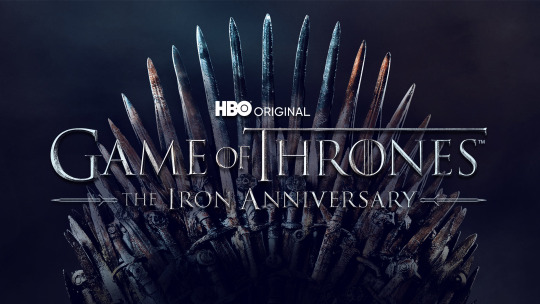
Link to Part 1
Time for the bottom half of the list. The four seasons here will surprise no one, but the order might.
#5 Season 6

You can tell what I most what to talk about here...but there's an order to these things.
S6 actually has a bunch of great ideas, but they drown beneath the most slapdash plotting and character work the show has seen yet in order to set the stage for the narrower conflicts of the last two seasons. It's notorious for bringing back characters who haven't been seen in a season or longer only to kill them off (Balon Greyjoy, Osha, Hodor, the Blackfish, Rickon, Walder Frey) or awkwardly graft them back into the main plot (Sandor Clegane, Bran). There are plot threads that ought to be compelling but are too rushed in execution, like the siege of Riverrun, Littlefinger's hand in the Battle of the Bastards, or Daenerys's time back among the Dothraki and then finally getting the hell out of Meereen. Arya hits on the only interesting part of her two-season sojourn in Braavos - a stage play, of all things - only for it to stumble at the end with a disappointing offscreen death and some incomprehensible philosophy ahead of the start of her murder tour of Westeros. There's also so much cutting off the branches, enough to be conspicuous; the final shot of Daenerys leading an armada of about half the remaining cast she assembled partially offscreen says that better than anything else. Well, not anything....
Highlight: Without exaggeration, the opening of S6E10 is easily my favorite sequence in all of GoT. The staging, the music, the mounting suspense even as it becomes increasingly obvious what's about to happen, the twisted religious references particularly in Cersei's mock confession to Unella, Tommen throwing himself out a window because he can't deal with the reality of how terrible his mother is, how Cersei gives absolutely no fucks whatsoever about murdering hundreds of people at once in a calculated act of vengeance largely prompted by her own poorly thought out actions - I love it all. It's the single most masterfully-executed act of villainy in the whole show - Daenerys torching King's Landing probably has a higher body count, but the presentation there is all muddled - and if I had any doubts about Cersei being my favorite multi-season major character they were silenced in this moment. The explosion of the Sept doesn't sit perfectly with me, because I liked the Tyrells and because of what I said about deaths like theirs and Renly's in the previous post under S2, but I think that unease only cements the strength of this sequence. It's an overused phrase in fandom these days, but GoT at its best is all about moral greyness that gives its audience room for multilayered reactions. Cersei nuking the Sept and making herself the sole power in King's Landing, which in a sense is just a more overt example of the kind of character/plot consolidation elsewhere represented by Daenerys's armada, is one of those events that's impossible to approach from a single angle if you care about any of the characters involved. And hey, it's not in the books (yet, presumably), so unlike Ned's death or the Red Wedding the GoT showrunners can take the credit for realizing this one.
Favorite death: Even leaving aside the Sept and related deaths there's a lot of good ones to choose from in S6. Ramsey is cathartic but too gory for me, Osha's was a clever callback but a little delayed, it's hard to pin down specific deaths when Daenerys incinerates the khals, and Arya only gets half credit for Walder Frey and his sons when she saves the rest of the house for the opening of S7. I'm thinking Hodor, not so much because I enjoy his character or the manner of his death but because it's a clever bit of playing with language (that must have been hell to render in other languages for dubbing) wrapped up in some entertainingly murky consent issues and some closed time loop weirdness. It's all very...extra? Is that the word for it?
Least favorite death: Offscreen deaths continue to be mostly letdowns, in this case Blackfish and the Waif. Way to botch the ending of Arya's already near-pointless Braavos arc, guys. Speaking of Arya, this spot goes to Lady Crane, whom the Waif somehow kills with a stool or something. It's a dumb way to send off an entertaining minor character.
#6 Season 8
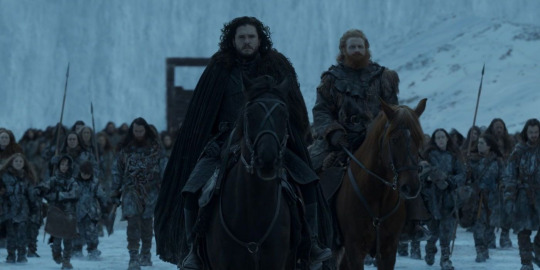
I swear that I'm not putting S8 this high solely because of Jonmund kind of sort of happening. I've never been very interested in either of them and the sex would be far too bear-on-otter to suit my pornographic preferences, but even so the choice to close out the series with them is hilarious.
I really don't need to elaborate on why S8 is down here; everyone who's ever watched the show has done as much in the nearly two years since it wrapped up. I do however need to explain why I've ranked not one but two seasons below it. My biggest argument here is that I don't believe it's fair to critique S8 for problems it inherited from earlier seasons. A non-comprehensive list:
Mad Queen Daenerys: unevenly built up beginning from S1 and continuing in some form through every following season
The questionable racial optics of Dany's army: also seeded as early as S1 and solidified by S3 with the Slaver's Bay arc
Cersei only succeeding because she makes stupid decisions and then lucks out until she doesn't: apparent from S1, directly lampshaded by Tywin in S3, fully on display with the Faith Militant arc of S5-6
Jaime not getting a redemption arc or falling in love with Brienne: evident with his repeated returns to Cersei throughout the show as one of the most consistent elements of his character, particularly in S4 and during the siege of Riverrun in S6
Tyrion grabbing the idiot ball/becoming a flat audience surrogate mouthpiece: started in S5 around the time the showrunners ran out of book material for him and wanted to make him more of a PoV character and his arc less of a downward spiral, although I've seen arguments that changes from the books involving his Tysha story and Shae set him on this trajectory even earlier
The hardening of Sansa's character: began in earnest in S4 and never let up from there
The strange ordering of antagonists: set down by S7's equally strange plot structure - the Night King had to come first with that setup
CleganeBowl and the dumber twists: from what I've heard the whole thing of writing around fans on the internet guessing plot twists started pretty much when the book content ended, so S5-6 maybe?
Yes, there's plenty to criticize about S8 on its own merits...but just as much that was merely the writers doing what they could at that point with deeply flawed material.
Highlight: This may sound cheesy, but the better parts of S8 are almost all the cinematic ones, whether that's E2 being a bottle episode with tons of poignant character send-offs before the big battle, a handful of deaths with actual satisfying weight like Jorah's and Theon's, and an epilogue that incorporates both closure for individuals and the broader uncertainty of messy socio-political systems that GoT has always been known for before working its way back to the Starks at the very end for some tidy bookending. Even imperfect moments like the Lannister twins' death and the resolution of Sansa's character felt weighty and appropriate based on what had come before.
Favorite death: Forget about the audio commentary attempting to flatten Cersei's character; Cersei and Jaime Lannister have an excellent end. Cersei especially, as the scenes of her stumbling her way down into the catacombs as the Red Keep crashes down around her really show off how her world is abruptly falling apart and how she retreats into her own self-interest at the end in spite of her demise being at least partially of her own doing. There's some stupid moments associated with these scenes, like Jaime dueling Euron to the death and CleganeBowl, but I can excuse those when the twins end up dying exactly where you'd expect them to: in each other's arms, in a ruined monument to their family's grand ambitions that, like Casterly Rock itself, was taken from another family.
Least favorite death: Quite a few dumb ones in S8 have become forever infamous. Missandei sticks out, and for me Varys too just as much because of how the writing pushes him to do the dumbest thing he could possibly do purely for the sake of killing him off ten minutes into the penultimate episode. But no one belongs here more than Daenerys Targaryen, killed at the height of a rushed and uncertain villain reveal by a man who takes advantage of their romantic history (who is also her family, because Targaryens) to stab her in a moment of vulnerability - pretty much only because another man tells him that Daenerys is the final boss. Narratively speaking that might be the case, but even so this is the end result of multiple seasons of middling-to-bad buildup. Not even Drogon burning the symbolism can salvage that. Also Fire Emblem: Three Houses did this scene and did it better.
#7 Season 5
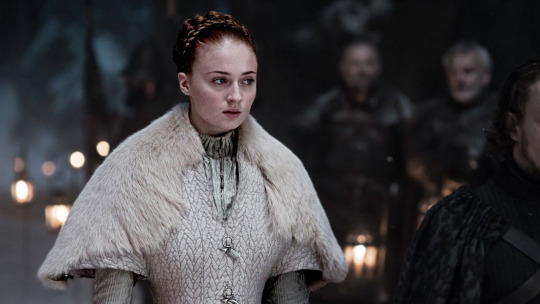
...Yeah, we're going to have to go there.
Sansa's rape is not a plot point that personally touches me much. It's terribly framed in the moment and the followup in later seasons is inconsistent at best, but it's not a kind of trauma I can relate to. On the other hand, in the very same episode Loras is tried and imprisoned for homosexuality, and Margery faces the same punishment for lying for her brother. That hits much closer to home, not just for the homophobia but also for the culture war undertones of the not!French Tyrells persecuted by a not!Anglo fanatic who later reveals himself to be the in-universe equivalent of a Protestant. The trial is just one part of Cersei's shortsighted scheming, just as Sansa being married off to Ramsey is part of Littlefinger's, and both of them get their comeuppance in the end...but it's unsettling all the same. I especially hate what the Faith Militant arc does to King's Landing in S5, swiftly converting it from my favorite setting in GoT to a tense theocratic nightmare that only remains interesting to me because Cersei is consistently awesome. What's more, pretty much everything about S5 that isn't viscerally uncomfortable is dragged out and dull instead: the Dorne arc, Daenerys's second season in Meereen, Arya in Braavos, Stannis and co. at Castle Black. The most any of these storylines can hope for is some kind of bombastic finale, and while several of them deliver it's not enough to make up for what comes before, or how disappointing everything here builds from S4. S4 has Oberyn, S5 has the Sand Snakes - I think that sums up the contrast well.
Highlight: S5 does get stronger near the end. As much as his character annoys me I did like the High Sparrow revealing his pseudo-Protestant bent to Cersei just before he imprisons her, and there's a cathartic rawness to Cersei's walk of atonement where you can both feel her pain and humiliation and understand that she's getting exactly what she deserves (and this is what leads into the climax of S6, so it deserves points just for that). The swiftness of Stannis's fall renders his death and that of his family a bit hollow, but it's brutal and final and fittingly ignominious for a character with such grand ambitions but so little relevance to the larger story. The fighting pits of Meereen sequence is cinematic if nothing else, and even the resolution to the Dorne arc salvages the whole thing a tiny bit by playing into the retributive cycles of vengeance idea (and Myrcella knows about the twincest and doesn't care, aww - no idea why that stuck with me, but it's cute all the same). Oh, and Hardhome...it's alright. Not great, not crap, but alright.
Favorite death: I don't know why, but Theon tossing Myranda to her death is always funny to me. Maybe because it's so unexpected?
Least favorite death: Arya's execution of Meryn Trant is meant to be another one of the season's big finale moments, but the scene is graphic and goes on forever and I can't help but be grossed out. This is different from, say, Shireen's death, which is supposed to be painful to witness.
#8 Season 7

I can't tell if S7's low ranking is as self-explanatory as S8's or not. At least one recent retrospective on GoT's ruined legacy I've come across outright asserts that S7 is judged less harshly in light of how bad S8 was. If it were not immediately obvious by where I've placed each of them, I don't share that opinion.
Because S7 is just a mess, and the drop-off in quality is so much more painful here than it is anywhere else in the series except maybe from S4 to S5 (and that's more about S4 being as good as it is). The pacing ramps up to uncomfortable levels to match the shortened seasons, the structure pivots awkwardly halfway through from Daenerys vs. Cersei to Jon/Dany caring about ice zombies, said pivot relies largely on characters (mostly Tyrion) making a series of catastrophically stupid tactical decisions, and very few of the smaller set pieces land with any real impact as the show's focus narrows to its endgame conflict. As with S6 there are still some good ideas, but they're botched in execution. The conflict between Sansa and Arya matches their characters, but the leadup to that conflict ending with Littlefinger's execution is missing some key steps. Daenerys's diverse armada pitted against Cersei weaponizing the xenophobia of the people of King's Landing could have been interesting, but there's little room to explore that when Cersei keeps winning only because Tyrion has such a firm grip on the idiot ball and when Euron gets so much screentime he barely warrants. Speaking of Tyrion's idiot ball, does anyone like the heist film-esque ice zombie retrieval plotline? Its stupidity is matched only by its utter futility, because Cersei isn't trustworthy and nobody seems to ever get that.
And how could I forget Sam's shit montage? Sums up S7 perfectly, really. To think that that is part of the only extended length of time the show ever spends in the Reach....
Highlight: A handful of character moments save this season from being irredeemable garbage. As you can guess from my screencap choice, Olenna's final scene is one of them, even if Highgarden itself is given insultingly short shrift. S7 also manages what I thought was previously impossible in that it makes me care somewhat about Ellaria Sand, courtesy of the awful death Cersei plans for her and her remaining daughter. The other Sand Snakes are killed with their own weapons, which shows off Euron's demented creativity if nothing else. I like the entertainingly twisted choice to cut the Jon/Dany sex scene with the reveal that they're related. And, uh...the Jonmund ship tease kind of makes the zombie retrieval team bearable? I'm really grasping at straws here.
Favorite death: It's more about her final dialogue with Jaime than her actual death, but again I'm going to have to highlight Olenna Tyrell here for lack of better options. She drops the bombshell about Joffrey that the audience figured out almost as soon as it happened but still, makes it plain what I've been saying about how Jaime's arc has never really been about redemption, and is just about the only person to ever call Cersei out for that whole mass murder thing. There's a reason "I want her to know it was me" became a meme format.
Least favorite death: There aren't any glaringly bad deaths in S7, just mediocre or unremarkable ones. I still think the decision to have Arya finish off House Frey in the season's opening rather than along with their father at the end of S6 was a strange one that doesn't add much of dramatic value.
4 notes
·
View notes
Note
Dude your writing is so stunning. I was gonna ask if you took any creative writing courses or something and saw you majored in literature so like no wonder lol. I wish to write as good as you but as someone who wants to drop out of college I dont see that happening. Anyway you're awesome and I hope you have a good day 💙💙
I am going to tell you a secret.
I did not learn how to write like this in college.
Most of my creative writing classes (and I only took 4) taught me to read. They were all workshops, and collaborative, and I learned how to read a piece of writing and identify what it was about--and that’s very different from identifying what the writer intended to write. It taught me to read a story about an adult whose divorced mother is remarrying and say, “Okay, but I don’t think that this story is about the capitalist recompartmentalization of families the way that the title seems to indicate. I think that the questions posed by the premise are ‘where are my roots? where does my identity come from? what dynamics do I retreat to when I need to feel safe, and what do I do when that refuge is taken away?’“ And identifying what a story is actually about is a very important part of the writing and revision process. Workshops also taught me to take critique without taking it personally, and to assess what was a critique worth taking, and whether the giver knew what they were talking about and what their opinion is worth.
Most of my literature courses taught me to think critically--in the sense of “identify this and examine what it means.” What does it mean, in Parable of the Sower, that empathy can be weaponized and used to incapacitate others? What does it mean, in RENT, that Benny is offering the protagonists jobs in their fields and they’re eschewing in favor of authenticity and integrity? What does Watership Down have to say about the nature-vs.-nurture argument and its limitations?
But I did not learn how to write like this in college. I learned how to write like this from fandom.
Some things came pre-loaded. I like writing dialogue, and I’ve been told I’m good at it, and I think it’s because eventually I worked out that nobody ever manages to say exactly what they mean and communication is frequently less like an arrow aiming for a target and more like a small boat bumping up against a dock while the people onboard try to tie their ropes to secure it. I like characters over action, and that’s reflected in the stories I tell--all very heavy character-driven stories, where the ratio of introspection to actual events is very high.
Z. Z. Packer’s “Drinking Coffee Elsewhere” taught me to appreciate the way that characterization leads to action; but I never put that into practice until I went on (forgive me) tumblr and started reading meta. dear-wormwoods is one of my biggest sources of Eddie characterization meta, and that has influenced my fics more than anything else in fandom, though we’ve never spoken. When I was reading bagginshield, I read avelera’s meta for them.
But I’ve also found that many of the best meta writers (that I’ve found anyway) are also the best writers I’ve read. I went straight from avelera’s bagginshield literary analysis to their Pacific Rim fanfiction “the only way out is down” and reading their commentary on how they shaped the work during revision. I read amarguerite’s “Some Friendlier Sky” (Les Miserables fanfiction) and then “An Ever-Fixed Mark” (Pride and Prejudice) and I started asking her questions--”you compare Courfeyrac to a cat, and then Mr. Darcy to a cat, even though they’re very different characters. What’s the thought process there?” and she told me and we talked about it. I read chrononautical’s “A Road from the Garden” (The Hobbit) and went line by line picking out the things I liked in the comment, and I had this sudden epiphany about how Tolkien shows the dwarves as sets of brothers, which means that they are technically a race of brothers in their presentation, so it was GENIUS to play around with the brother dynamic in a work like that and reflect on how frequently an individual will tolerate mistreatment of themselves that they would never permit to happen to someone they loved--like, say, a brother.
I learned the basics of literary criticism and critical analysis from college, and from reading the western canon and trying to pick apart things that were useful to me. But it’s so much easier when everything is written in vernacular instead of faux-detached academic writing, and when everyone involved is genuinely excited about and dedicated to the work instead of being forced to dwell on The Old Man and the Sea yet again, and when there’s space for people to go back and forth analyzing and agreeing or saying “but what if” or rejecting and are just united by this love of the content or the characters or the book or the history.
You can learn to write like--well, you would write like you, not like me, that’s how style is. But you don’t have to go to college to do it. My current style is not the product of the institution that gave me my degree--it’s the product of more recent years’ immersion in fanfiction (and more recently some traditionally published original work) and music and content I get for free online. And you can also get a circle of people who are happy to write together, read each other’s work, comment on each other’s strengths and the things they like, make suggestions as to how to improve things. You don’t have to do that in college. You just have to read and write a lot, and the things that you read will influence what writing you produce, and in identifying what you like about the things you read and how they do the things they do, you will be able to look at your own work critically and shape it more towards your satisfaction.
The work I’m writing for IT is some of the best work of my life. TTHAEL is the first long work I’ve completed to my satisfaction. Indelicate is the first thing I’ve written that I feel is really exemplary of my style. Margot’s Room is the first self-contained short work I’ve completed to my satisfaction--and the first explicit sexual content I’ve written that I’m happy with both level of detail and atmosphere. Even Automatic-Mechanical-Pneumatic--which I wrote and posted in the same day, so it’s more of a draft--I look at it and recognize it has pacing issues (you can tell I was racing a clock to get the words out), some of the symbolism is too overt because the characters are too self-aware of it, at one point I tripped up and referred to a character by the real-world inspiration--but that’s a solid draft and it has good parts.
You don’t have to go to college to learn to write. Writing is a skill, and writing is work. And there are advantages that people in colleges have re: networking and libraries and available resources and professors who are being paid to give you feedback. But no institution is going to put you through a four-year program and at the end you’ll come out a “finished” writer, with no more room to improve. That’s something you have to do on your own.
34 notes
·
View notes
Photo

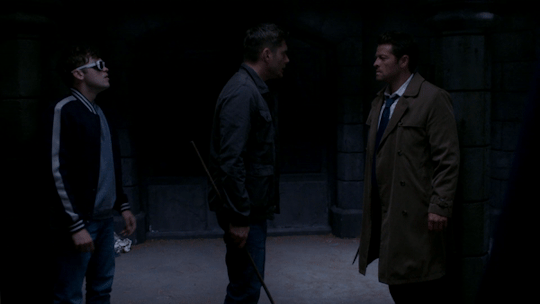

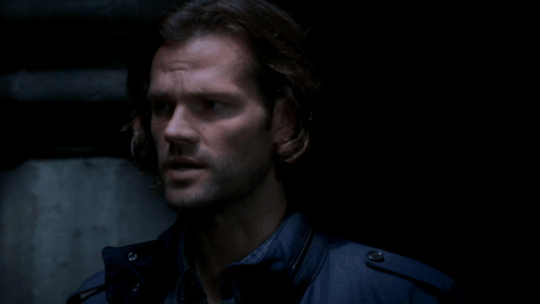
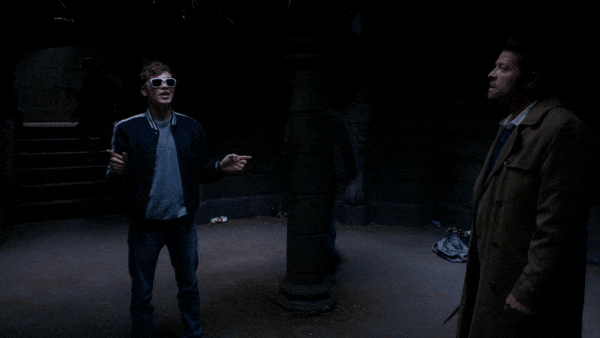
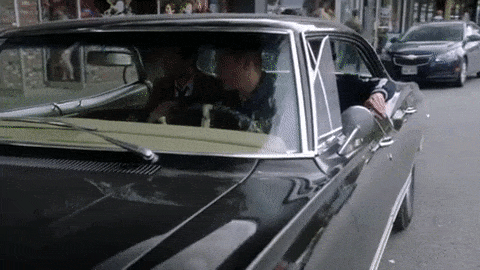

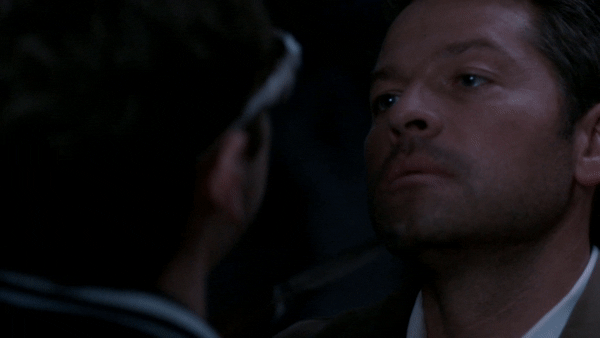

The start of a gallery regarding Belphegor and the guys, but including a great deal of meta and extra gifs behind the cut, including relevance explicitly to Dean and Castiel, as well as Belphegor’s mythological relevance.
Edit: Since this post is making the rounds I’ma drop in my Belphegor meta-fanvid too. The meta/extra gifs are below the vid.
youtube
Yeah I know I’m a day late, no I don’t know if anyone has beaten me to this, I know some people beat me to talking about belphegor beyond me vagueblog screaming about him showing up on twitter with livetweets. For those who haven’t seen:
Belphegor - a Moabite god absorbed into Hebrew lore and then Christianity as a major DEMON. The name Belphegor means “lord of opening” or “lord Baal of Mt. Phegor.” As a Moabite deity, he was known as Baal-Peor and ruled over fertility and sexual power. He was worshipped in the form of a phallus. -- that giant rock he talked about worshipping, there you go.
In the KABBALAH, Belphegor was an angel in the order of principalities prior to his fall. He is one of the Togarini, “the wranglers.” He is an archdemon who is part of the demonic counterparts to the angels who rule the 10 sephirot of the Tree of Life; he rules over the sixth sephirah. He sits on a pierced chair, for excrement is his sacrificial offering. In Christian demonology, Belphegor is the incarnation of one of the SEVEN DEADLY SINS, sloth, characterized by negligence and apathy. According to St. Thomas Aquinas, all sins that arise from ignorance are caused by sloth.
Belphegor also rules misogyny and licentious men. He emerged from HELL to investigate the marital state among humans. For a time, he lived as a man to experience sexual pleasures. Appalled, he fled back to hell, happy that intercourse between men and women did not exist there.-- here’s the big block that I find fascinating.
Gully, Rosemary. 2009. The Encyclopedia of Demons and Demonology. New York: Visionary Living, Inc., pp. 27-28.
(For more discussion of Belphegor’s history and mythology on this blog, click this link (x) but I’m mostly narrowing it down to what’s relevant for address here.)
With that out of the way, I refer you to the gallery above, which is only a fraction of what I’ve clipped from the episode.
(Edit: As new things have come to light with a rewatch, or as new thoughts come up, I’ve been reblogging this post with additions; however, at the end of the post, I’m going to make headline titles for update thresholds and include it in here as a sort of Belphegor introduction masterpost. Any time I get to glance at part of this episode again it just gets LOUDER.)
The camera work is uncanny. Castiel and Dean are repeatedly cast not only as a unit, or Sam blotted off, or divided, but of a point of focus. A few more examples:




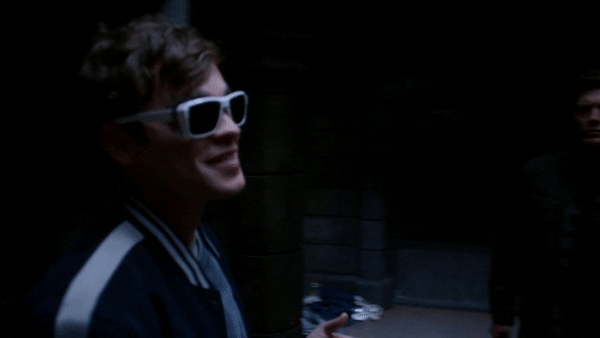
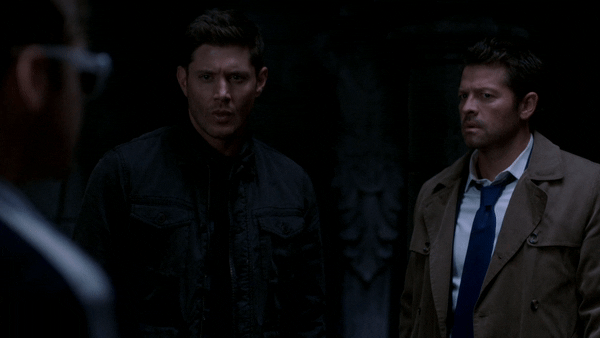
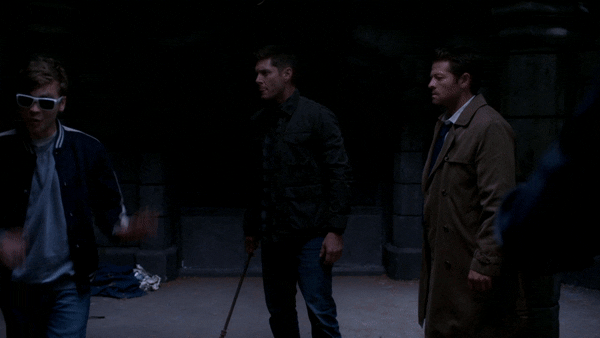


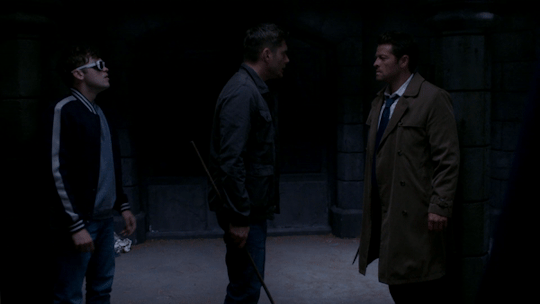
Oh wow Belphegor really just staring at them.
Think I’m just choosing frames I like? Check back at the scene. Whenever Sam engages it’s literally from a different, peripheral shot as so:
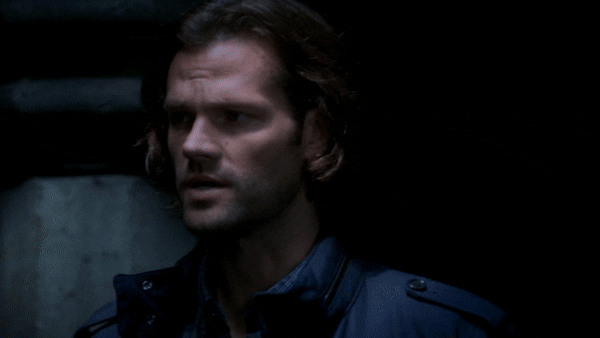
This filming style isn’t single shots, but the entire scene. Oh, I don’t mean the entire scene, I mean the entire episode. The only place this rule wavers is when literally everybody is packed in the Impala, including when they save the mother and child, and until people decompress it’s impossible to do such controlled shots.
But then there IS when they decompress as I put in the original gallery.

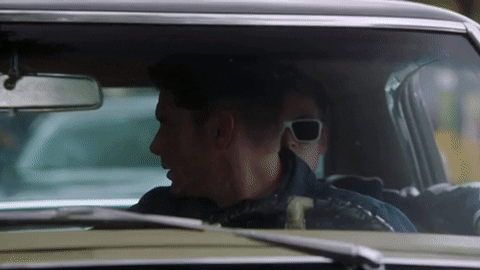
Belphegor sits witness to the pain and upset over Cas, unable to look at him. And, shortly after talking about the giant penis he used to worship and flirting with Dean, asks who the child was to them after Cas has stormed out, finding out about it being their son.
At this point both Castiel and Dean have had their standoffs with Belphegor, which I side by sided in the top gallery. But Dean’s integration with Belphegor goes an entirely extra level.

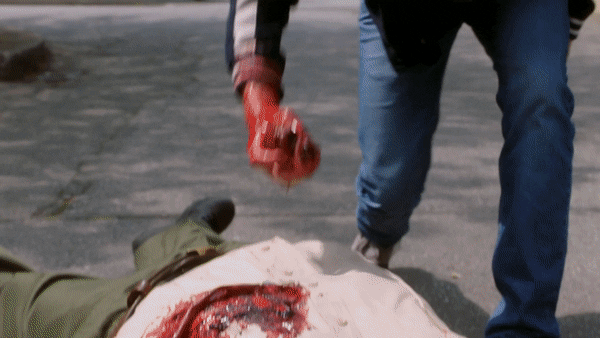
We’ll handwave any deep readings about the heart of a man being needed -- but the simple fact is, as we know, this is when Dean and Belphegor encounter the white woman.
That alone is a fascinating point;
Whether you take Sam’s encounter as his serial killer fetish, or his clown phobia, or some people’s read of toxic parenting, or a combination of these -- the first two more likely to tickle the general audience -- this is clear.
Whether you take Cas’ encounter with Bloody Mary as the secret about Jack and guilt over Mary, or the secret over the Empty and general guilt over failing Jack, his connection is loudly clear.
The woman in white was a spouse betrayed by her partner and driven to madness where she killed her children and then herself -- something fairly clear if we remember the metaphorical ledge Dean was on at the end of the season that he steered away from, but the argument continues.
Blahblah *heterosexual handwave* just subtext just interpretation only the other two matter for Reasons(TM), we know how that will go. This, or the random divorce drop from the victim girls for totally inoccuous and random reasons aside, is just a worthwhile note to put in here as we consider the framing of Belphegor.
Throughout the episode, Sam has no identifiable major exchange with Belphegor. He happens to be in the vicinity, occasionally mediating Dean and Cas, or in the same car, but there is no forward led conversation, there is no personal tension or banter, and most of all there isn’t even any attempt at directorial focus. If anything, directorial blotting. Sam’s plot shines more in being a forward moving, smart hunter mediating the two here, but if we’re here to look at Belphegor--
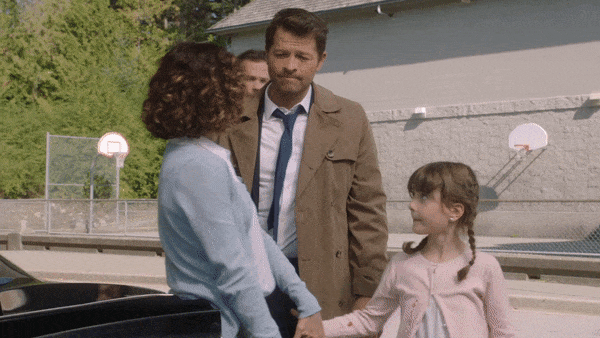
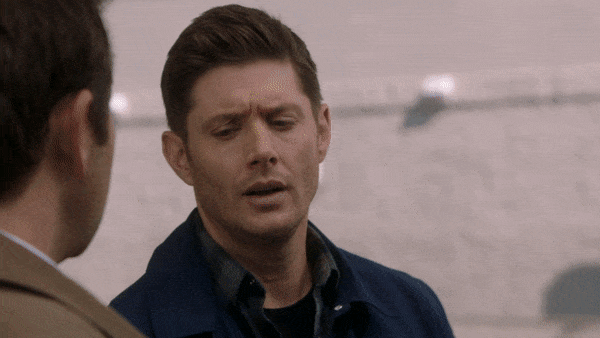
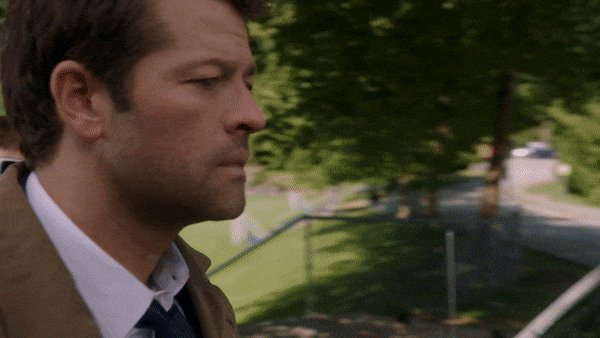
As Castiel sadly watches the rescued mother and child go to the school, in the wake of the death of his son, Dean only tersely checks on him. It’s strained, and Castiel is left staggered, only for us yet again to find Belphegor framed into the conversation, observing, as he has through the previous shots.
Belphegor’s placement is right between Dean and Cas, leaving it almost inevitable that as we move forward, he will annex emotional territory if by trust or nuisance to dig a deeper wound and antagonize the marriage he observes dissolving in front of him, a very personal and living manifestation of their struggles for these two to overcome, and inevitably part of what will send Castiel away briefly in 15.3 as he feels himself growing more and more detached from the Winchesters -- particularly Dean, as Sam is actively still engaging with him as is typical of them but like Entertainment Weekly recently put it, Castiel does has his favorite Winchester, and they’re totally-not-going-through-divorce-waves here, just totally heterosexual brovorce, of course.
Given considering my position of the overt and present canonicity of their relationship please note I’m only writing sarcastically towards the inevitable stupidity that haunts this fandom via anti dialogue and those that internalize it, but here it is, folks.
If anyone wants to even try to challenge me, I invite them to find Sam drawing belphegor’s focus on any front or being framed in the shots as Castiel and Dean are here. Belphegor is ... going to be a ride, folks. Buckle up. He’s literally been observing the hunter husbands, wracked with pain over the loss of their child, in active conflict despite their lingering stance as a unit, having held his ground with both of them to feel out their pain and rage each to themselves, and left to sit, and watch, and find what dark humor he may watch from them.
“Wanna talk about it?”
(Suggested reading: check out @tinkdw‘s post about them dividing Cas from his humanity *ba dum chink* and focusing on his angelicness this episode)
----
UPDATE 1
A belated addendum a few hours late I forgot to include but intended to: It has not escaped me that Dean and Cas also were both part of Belphegor’s spell casting. The aforementioned heart of a man with the trivial second ingredient of salt (truly not trivial at all in the alchemical scale of it, but that’s a topic for another time--just in SPNverse it seems weirdly easy; breaking down the alchemy in the last few seasons and the use of the salt in spell is its own essay), and the other common graveyard dirt and very conveniently angel blood. These things both created intensely powerful deus ex machinas that fall back to other points I made in the OP that are incredibly suspicious about the arrangement, and I’m more curious on if we should expect multiple parts of a spell eg reverse trials if you will or what.
I don’t consider these things a lack in SPN spellcasting integrity in writing. I consider these warnings.
UPDATE 2
Along with updates in the original post, someone posted this clip on twitter giggling about Dean’s expression, and something else I somehow missed the first time caught my eye.
youtube
Every time Belphegor opts to observe people or turn, while he comments on beauty and appearance (or stone penises or Dean being gorgeous), beyond his individual compliment of Dean – he is turning his head at couples. Or, well, we assume couples. At Units Of Two People. The two people units are:
A woman and a woman
A man and a woman
A man and a man.
Outside of the vehicle Belphegor is not taking any particular time paying attention to individuals. Only duos. The two women pass in front of the hearts, and one (the woman in khaki) even gestures at it to sort of make the woman in green look.

The man and the women walk by, vaguely locking arms.

Belphegor looks straight between these units. He leans forward, discussing people on earth being attractive. He turns and looks out the window to observe the two men now walking past the window with hearts.

Drops the comment about worshipping a giant penis, and so forth.
But the direct observation of duos, potentially queer ones literally framed in hearts in case anybody misses it for not being hetnorm, is… well, in lieu of the OP, this is. Yeah. It’s a whole thing. Holy crap.
UPDATE 3
This one isn’t necessarily big enough for a central update, and isn’t even entirely Belphegor focused as Belphegor adjacent. A friend ( @tarend ) had asked passively why bikes were so prominently featured in this episode, so here’s what I’ve found.
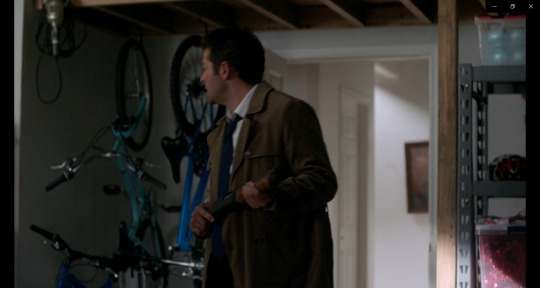
The green and blue bikes feature predominantly in the clown victim house from the first scene we see the garage, fairly early in the episode and every other showing until they’re extracted from the house. Often central, doorway, access, or backshadow in most shots. Trying to pin it on a single character would be ignoring the broadness of it, but the presence was enough to take note of.
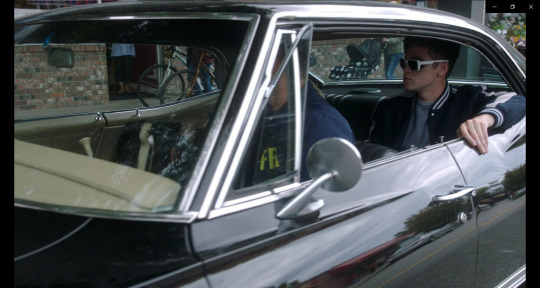
Various two people units roll around with bikes of different and more muted colors.

The two dudes, one of them has a green bike and one has a grocery sack which I imagine ISN’T fruit from the tree of life.
I do find it weird and, especially since the green and blue bike collectively manage to get several shared minutes of screen time in a busy episode, I have to wonder, but I can’t find anything meaningful here without jumping to the common “green and blue” thing and a random joke-reach towards Queen which isn’t really my flavor of meta despite it even kind of matching the people passing by. The overlap is there and tangible, regardless, and passes in the background of Belphegor, so I’ll leave that here as a general sentiment.
Compared to the above gold mine of far more overt material, if this ever was intended to be an intentional nod of some sort, I feel like it’s been overshadowed entirely by the other content which might as well have been blasted from a bull horn, but maybe someone else can find use in it in association. Aside from the street highlights in the car while Dean sits by with Belphegor, the prominent double bike placement is best witnessed rather than screenshot into eternity in any scene involving Clown House Garage.
Though I may point out the dynamic impala shot with the paired bikes in the background is immediately followed by a stroller that colllectively haunt the three people in the car, but whether I’d swear to that being intentionally syncretic, I’m unsure. But I do feel it’s worth notating.

I’m sure you all know I’m guarded about things like this fandom’s build on key colors and don’t apply it in meta outside of standard lighting theory, and generally even props are things I ignore unless they’re actual framing and blocking focuses, but the bikes do ride a line. They just lack the overall thematic story use most things I talk about do, like mystic symbols and the ilk. I would probably completely disregard this were it not for the other elements above, but now I’ll be keeping an eye on it.
UPDATE 4
Yet another thought more from @tarend than me, but his ass just about never posts so I might as well plug it into the viral post with some credit.
There seems to be painstaking effort to frame Belphegor with stop signs.
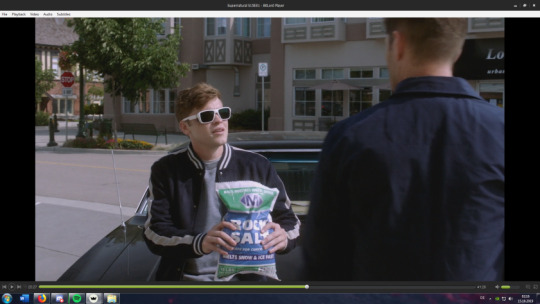
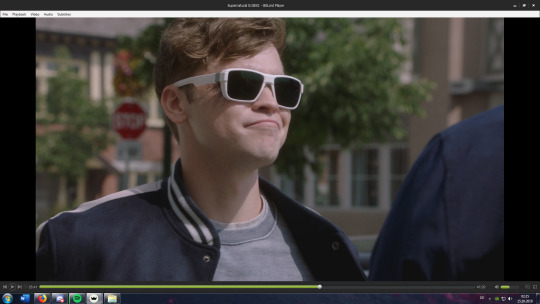

Cough
Crack aside it’s just some angle play that could be coincidence but I’m going to be throwing that out there for meta fodder for others while this spreads around until I can truly rewatch since life is seriously climbing me right now.
Tarend also points out the school was named after The Great Dissenter (Link).
I’m going to have a bit of a comparative study on Belphegor’s and Chuck’s mannerisms for consideration but life didn’t even give me 30 minutes for a video edit today much less a rewatch.
#supernatural#spn#15.01#final season#belphegor#directing#divorce#15x01#15.1#15x1#back and to the future#destiel#deancas#meta#my meta#mine#tree of life#thagirion#tiphareth#art
718 notes
·
View notes